The answer can be found in our article: https://doi.org/10.1057/s41599-023-02422-2


1. Dezember 2023
von LS
Kommentare deaktiviert für Are verbs suitable as response options?
The answer can be found in our article: https://doi.org/10.1057/s41599-023-02422-2

28. November 2023
von LS
Kommentare deaktiviert für 2023
As 2023 is coming to an end, here is a short review of my year:
4 books:
9 articles & book chapters in 5 languages:
More Info: here
14. September 2023
von LS
Kommentare deaktiviert für Crosslinguistic Facets of the Subjunctive
2023 ist erneut das Jahr der Bücher ☺️
Der Fokus in diesem Band: Kann ein wichtiges Kapitel der Grammatik mit einer einfachen Formel erklärbar werden?
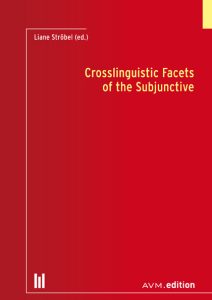
No other grammatical phenomenon causes as many problems in teaching and learning as the subjunctive. Most grammars devote as many pages to the presentation of the rules as to the exceptions. This becomes even more frustrating when dealing with the differences, not only between different language families, but even within the Romance language family alone, since it seems that each language shapes the functional area of the subjunctive individually. The aim of this volume is therefore to reconsider the representation of the subjunctive in Romance languages in a crosslinguistic and contrastive way. First, an overview of research in this area from the beginnings to the latest neurolinguistic findings will explore the complexity of the issue. Next, specific phenomena of the subjunctive at the interface of its functional domain with the indicative will be illustrated by means of appropriate case studies. On this basis, an attempt is made to trace the polyfunctionality and the differing uses in the Romance languages and beyond to a common pattern with language-specific margins. This allows us to explain, not only contrastive differences, but also the decline of the subjunctive in some domains and languages, as well as demonstrate the range of substitution possibilities. Finally, the view is extended to other language families and new impulses for foreign language teaching are presented. (Link)
27. Juni 2023
von LS
Kommentare deaktiviert für Contextual and Crosslinguistic Facets of Emotion Concepts
Erster Blick auf das neue Buch ?

Jetzt auch bestellbar: https://www.avm-verlag.de/detailview?no=L95477163
Inhaltsverzeichnis:
https://www.avm-verlag.de/res/user/avm/media/9783954771639_v.pdf
Leseprobe:
https://www.avm-verlag.de/res/user/avm/media/9783954771639_p.pdf
Flyer:
https://www.avm-verlag.de/res/user/avm/media/9783954771639_f.pdf
6. Juni 2023
von LS
Kommentare deaktiviert für Framing Effects in the Media Coverage of the Migrant Crisis in the French Press (2015 vs. 2018)
Mein Artikel „Framing Effects in the Media Coverage of the Migrant Crisis
in the French Press (2015 vs. 2018)“ ist im Buch „The Representation
of REFUGEES and MIGRANTS in European National Media Discourses from 2015 to 2017“ (print & ebook) erschienen!

9. Mai 2023
von LS
Kommentare deaktiviert für Konzepte der Nation im europäischen Kontext im 21. Jahrhundert
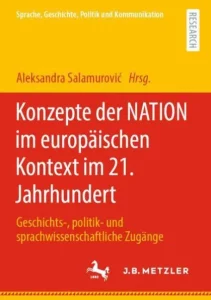
Als ebook bereits erhältlich: Salamurović, A. (Hrsg.). Konzepte der NATION im europäischen Kontext im 21. Jahrhundert: Geschichts-, politik- und sprachwissenschaftliche Zugänge, Linguistik in Empirie und Theorie/Empirical and Theoretical Linguistics. Berlin: Springer.
Mit einem Beitrag von mir: „Auf der Suche nach kollektiver Identität – Der Begriff Nation im Spannungsfeld europäischer Renaissance und einzelstaatlicher Exitbestrebungen“ (S.265-286)
20. März 2023
von LS
Kommentare deaktiviert für International Discourses of Authoritarian Populism – Varieties and Approaches
Finally available as hardback, paperback & ebook:
„International Discourses of Authoritarian Populism – Varieties and Approaches“
Through its multidisciplinarity, „International Discourses of Authoritarian Populism“ provides fresh insights (with 15 cutting-edge chapters probing into the diversity of present-day populist discourse from across the world) into the existing and potential dangers of populism, and a basis for further critical assessment and discussion.
It will be a key resource for scholars and students across a range of disciplines, including sociology, political science, linguistics, media and communication studies, literary studies, and history.
Moreover, it will be of special interest to professionals who deal with both national and international issues of populism.
https://www.routledge.com/International-Discourses-of-Authoritarian-Populism-Varieties-and-Approaches/Deringer-Strobel/p/book/9781032315614
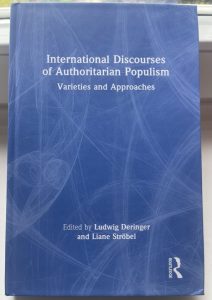
16. Februar 2023
von LS
Kommentare deaktiviert für Le pouvoir du bleu / Die starke Farbe Blau
„Le pouvoir du bleu / Die starke Farbe Blau“
Sur le plan synchronique, nous tenterons d’analyser le vaste champ associatif lié au bleu, en partant des collocations, des expressions idiomatiques et des locutions, à travers son rôle dans la publicité, le marketing, le cinéma et l’art du XXIe jusqu’à sa fonction de symbole comme maillot national de l’équipe de France ou drapeau européen.
Au niveau diatopique, le bleu couleur de la mer désigne non seulement un espace profondément symbolique, mais aussi un carrefour culturel et linguistique, celui de la Côte d’Azur, avec les peintres impressionnistes d’abord, les exilés des guerres ensuite, puis les fans du cinéma qui se sont rencontrés dans cette enclave de plusieurs langues romanes avec leurs variétés dialectiques.
Face à ces diverses apparentés ou facettes, il est légitime de s’interroger : comment d’une part le bleu est-il arrivé à devenir le logo de l’entreprise Europe ? Et quel est, d’autre part, son pouvoir d’intégration ? Ces questions nous ont amenées à formuler l’hypothèse suivante : les couleurs et leur symbolisme sont liés aux civilisations et à leurs identités culturelles. Et le bleu y a des valeurs certaines ainsi qu’un pouvoir particulier. Est-ce ce dernier qui contribuera à unir l’Europe ? Comment et pourquoi ? Notre approche interdisciplinaire a pour but de mettre l’accent sur les points de vue culturel, linguistique, littéraire et artistique à propos de cette couleur qui a fini par être sélectionnées pour représenter l’idée et l’union européennes. Nous avons donc fait appel à des linguistes, des littéraires, des historiens et historiens de l’art dans le dessein de contribuer, par leurs réflexions générales ou ponctuelles, à une meilleure connaissance du bleu.
Nous regrouperons les réponses à ces diverses questions dans quatre parties : le bleu azur, le bleu couleur de la vie, le bleu couleur de l’écriture et ses réflexions.
Merci à Sara Izzo, Magalie Nieradka-Steiner, Jutta Hausmann, Marie Weyrich, Christoph Oliver Mayer, Shoshana-Rose Marzel, Şirin Dadaş Aina Sandrini, Hannah Steurer, Michael Hohmann, Daniel Bernard, Viktoria Sophie Lühr.
Angelica Rieger et Liane Ströbel
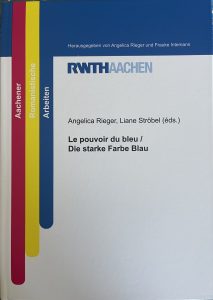
20. Juli 2022
von LS
Kommentare deaktiviert für International Discourses of Authoritarian Populism
Now available: „International Discourses of Authoritarian Populism –
Varieties and Approaches“
Not adhering to any particular school, the volume explores populism from a variety of disciplines and perspectives, with contributions characterized by heuristic openness as called for by the manifold manifestations of populism.The chapters balance theoretical and empirical studies, as well as quantitative and qualitative surveys and case studies, to offer readings on historical and new types of populism, and the politicians associated with these variates.
Authors draw on a variety of print, digital, textual, and visual source materials to provide a close examination of the phenomena interconnected with populism, including separatism (Catalexit), human rights and legal issues, debate rhetoric, and journalism, with many authors writing as insiders about the situation within their own country.
Many thanks to: Michael Adams, Stephen Alomes, Nelly Margarita Arenas, Eleni Blum, Stella Gianfreda, Thea Göhring, Sandra Issel-Dombert, David H. Kamens, Urpo Kovala, Alicia Rodríguez López, Jennifer M. Love, Virpi Salojärvi, Tuija Saresma, Lilla Petronella Szabó, Tuula Vaarakallio and Ágnes Virág.
Ludwig Deringer and Liane Ströbel
https://www.routledge.com/International-Discourses-of-Authoritarian-Populism-Varieties-and-Approaches/Deringer-Strobel/p/book/9781032315614
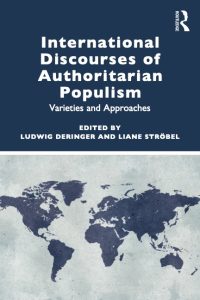
Heute live via Gather mit unserem Panel „Collective action in time of crisis: when hashtags give the courage to speak up“ und vier sehr interessanten Vorträgen auf der SLA 2022 Spring Conference in Boulder.
Mehr Infos auf der offiziellen Homepage: SLA2022

19. November 2021
von LS
Kommentare deaktiviert für Herzlichen Glückwunsch! ????
2021 neigt sich dem Ende entgegen, von daher ein Rückblick auf die eingereichten und erfolgreich verteidigten Dissertationen, bei denen ich Erstgutachter:
bzw. Zweitgutachter:
sein durfte!
30. Juni 2021
von LS
Kommentare deaktiviert für Populismus und Fake News – Herausforderungen und Grenzen der linguistischen Analyse
Freue mich heute auf interessante Diskussionen im Anschluss an meinen Vortrag „Populismus und Fake News – Herausforderungen und Grenzen der linguistischen Analyse“ an der Universität Freiburg.
22. Juni 2021
von LS
Kommentare deaktiviert für Geopolitical Characteristics of Women’s Empowerment through Language in Social Media
Heute haben wir (@Inklusionsling, @ViolaLorella, @linguistics2) mit dem Panel 1 „Geopolitical Characteristics of Women’s Empowerment through Language in Social Media“ die 11th biennial conference of the International Gender and Language Association (IGALA11) an der Queen Mary University of London eröffnet.

Die Videos der Vorträge unserer Sektion sind noch bis Ende Juni auf der Konferenzwebseite abrufbar!

In der Zeitschrift für italienische Kultur der Gegenwart (Zibaldone, Band 71, S. 99-107) ist mein Artikel „Wege aus der Manipulationsspirale. Methoden der Fake News-Aufdeckung im Umfeld der Covid 19-Impfung“ erschienen.

20. April 2021
von LS
Kommentare deaktiviert für Der Begriff „Nation“ im Spannungsfeld von europäischer Renaissance und einzelstaatlichen Exitbestrebungen
Letzte Woche war ich (zumindest online) auf der Tagung des Arbeitskreises „Sprache, Geschichte, Politik und Kommunikation“ zum Thema „National, Transnational, Anational: Konzepte der NATION im europäischen Kontext im 21. Jahrhundert“ an der Friedrich-Schiller-Universität Jena mit dem Vortrag „Der Begriff „Nation“ im Spannungsfeld von europäischer Renaissance und einzelstaatlichen Exitbestrebungen„.
Abstrakt: Wir befinden uns in einer Zeit, in der progressiv betriebener Nationalismus uns dazu zwingt das Konzept von „Nation“ neu zu überdenken.
Etymologisch aus dem klassischen lateinischen nasci „geboren werden“ hervorgegangen, ist wahrscheinlich kein Begriff so stark mit Identität und Identitätssuche verbunden, wie der Begriff „Nation“, aber auch kein anderer Begriff steht im 21. Jahrhundert vor größeren Herausforderungen (Bevelander & Wodak, 2019). Gerade das Projekt Europa scheint einen internen Abspaltungsprozess des Begriffs, in nationale Vielfalt auf der einen und nationale Interessen auf der andern, gefördert zu haben (Koller, 2012; Wodak & Boukala, 2015).
Die linguistische Analyse umfasst ein kombiniertes Verfahren auf drei Ebenen. Neben kognitiven Frames, werden subjektive Werteskalen und sensomotorische Konzepte untersucht, die zur Einbettung und (individuellen) Definition des Begriffs „Nation“ im Umfeld von Europabefürwortern und Europagegnern verwendet werden:
1. Frames sind eine der effektivsten Kommunikationsstrategien. Frames untersuchen wie Konzepte im Kopf organisiert und repräsentiert werden (Croft, 2009; Langacker, 1987; Croft & Cruse, 2004; Ruiz de Mendoza, 2014).
2. Mit Hilfe von subjektiven Werteskalen, die eine kognitive Wertschätzung beinhalten (Reyes & Morrett, 2015; Harb et al. 2008), können Begriffe intensiviert, betont oder ausgeblendet werden (Hatzivassiloglou & McKeown, 1997; Hatzivassiloglou & Wiebe 2000; Wiebe, 2000; Wilson et al, 2009).
3. Gerade sensomotorische Konzepte werden häufig in persuasiven Diskurssituationen verwendet und erscheinen „unschuldiger“ und weniger „wirksam“ als expressive Metaphern (Musolff, 2019; Ströbel 2016, 2017a,b; 2018 a,b; 2019a,b). Doch wie neurolinguistische Studien zeigen, ist der Schein trügerisch (Hauk & Pulvermüller 2004). Sensomotorische Konzepte steuern aktiv die Informationsvermittlung, indem sie als dynamische Verstärker prototypischer Frames und subjektiver Markierungen fungieren (Haser 2005; McGlone 2007; Pinker 2007; Ghiglione 1974; Landau, Meier & Keefer 2010; Landau, Robinson & Meier 2013).
Mit Hilfe einer kombinierten Analyse dieser drei Ebenen identifiziert, isoliert und kategorisiert der Vortrag Spielräume des Deutungsrahmens des Begriffs „Nation“ im politischen Diskurs in Frankreich, Spanien und Italien. In allen drei Ländern laufen aktuell Wetten über den Zeitpunkt des Frexits (oder Franxits), Españxits, Italexits. Die zeitliche und thematische Eingrenzung des Korpus beschränkt sich auf den Zeitraum der Brexitdebatte bis hin zur Covid-19 Krise. Die sprachlichen Strategien der Identitätsbildung und Selbstidentifikation in Krisenzeiten werden innerhalb der unterschiedlichen Lager (Marine Le Pen vs. Emmanuel Macron, Pedro Sánchez/Pablo Iglesias vs. Vox, Giuseppe Conte vs. Matteo Salvini) und im Sprachvergleich (französisch, spanisch und italienisch) kritisch betrachtet. Ziel des Vortrags ist es, das Konfliktpotentials der Verwendung des Begriffs „Nation“ und die Polysemie dieses Begriffes im nationalen, wie auch internationalen Diskurs aufzuzeigen.
Weitere Informationen : https://diskurswestbalkan.uni-jena.de/forschung/konferenz-15-17-april-2021/
23. März 2021
von LS
Kommentare deaktiviert für Veröffentlichung der „Liste des qualifiés 2021 aux fonctions de professeur des universités“
Sehr glücklich meinen Namen auf der „Liste des qualifiés 2021 aux fonctions de professeur des universités“ (https://www.galaxie.enseignementsup-recherche.gouv.fr/ensup/qualification/Resultats_2021/Qualif_PR_2021.pdf) des Ministère de l’Enseignement supérieur, de la Recherche et de l’Innovation (https://www.enseignementsup-recherche.gouv.fr) zu sehen!!!
21. März 2021
von LS
Kommentare deaktiviert für Les ‘verbes haptiques’ dans les discours politiques actuels – une approche dans le cadre de la cognition incorporée et de l’énaction
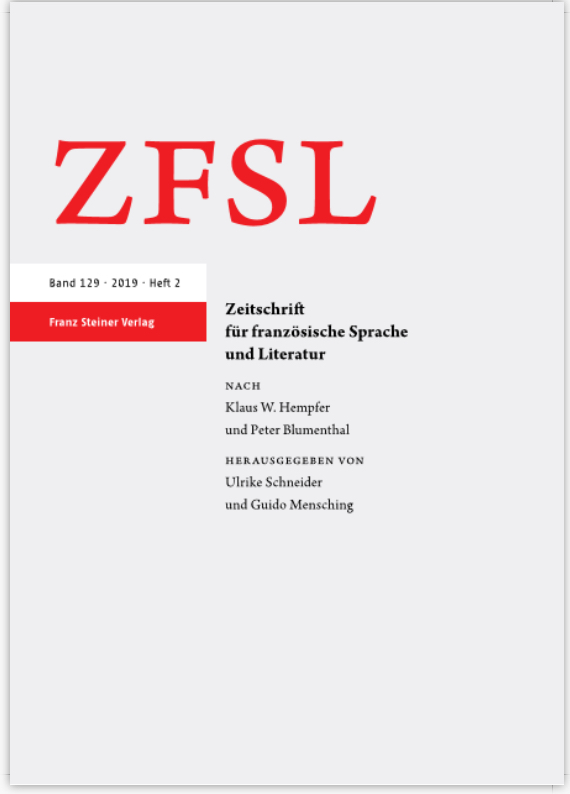
Mein Artikel Les ‘verbes haptiques’ dans les discours politiques actuels – une approche dans le cadre de la cognition incorporée et de l’énaction / ‘Haptic verbs’ in current political speeches – an approach within the framework of embodied cognition and enaction ist in der Zeitschrift für französische Sprache und Literatur erschienen.
Mehr hier: https://elibrary.steiner-verlag.de/article/10.25162/zfsl-2019-0003
31. Juli 2020
von LS
Kommentare deaktiviert für #Brexit, #FakeNews, #HateSpeech #Covid-19
Nach zwei Online-Konferenzen in Birmingham (#UKCLC2020) und Cambridge (#ICMSXXIII) wünsche ich allen eine produktive vorlesungsfreie Zeit & viele neue Projekte für das Wintersemester!


27. Juni 2020
von LS
Kommentare deaktiviert für The Curbing of Fake News: A three level linguistic approach
Die Ergebnisse meiner Idee „The Curbing of Fake News: A three level linguistic approach“ werden auf der 23rd International Conference on Multidisciplinary Studies: Resilience for Survival (30-31 July 2020) an der Cambridge University online vorgestellt.
Abstract: The COVID-19 outbreak was accompanied by a massive „infodemic“, making it difficult to identify reliable sources. While poorly edited fake news fundamentally differs from trustworthy information in the area of narrative structure (van der Linden, 2017), the situation is much different with fake news of higher editorial standards. Our goal is to develop targeted methods for identifying fake news using neurolinguistic approaches and big data analysis. The innovative character of this approach lies in the inclusion of linguistic elements beyond content analysis. In contrast to existing work, the focus is not on frequency analysis of keywords, metaphors or the interaction between the headlines and the content of the articles (Granik & Mesyura, 2017; Rashkin et al., 2017; Bourgonje et al., 2017), but on the identification of unconscious linguistic phenomena on three distinctive levels: the conceptual, the motivational and the iconic level; i.e. of speech material that is difficult to consciously manipulate or suppress. One advantage of this method, which should not be underestimated, is that untrustworthy sources fall off the grid, thus allowing for a targeted isolation of fake news on the internet in general and concerning the current pandemic in particular. Our corpus consists of online articles in three languages (English, German and Spanish).
12. Juni 2020
von LS
Kommentare deaktiviert für Sprache, Rede & Kognition – am Beispiel der verbos leves im Portugiesischen (Portugal/Brasilien)
In der Reihe Iberolinguistica von Peter Lang ist das Buch „Zwischen Sprechen und Sprache / Entre fala e língua“ (herausgegeben von Benjamin Meisnitzer und Elissa Pustka) erschienen. Auf den Seiten 255-277 findet sich mein Artikel Sprache, Rede & Kognition – am Beispiel der verbos leves im Portugiesischen (Portugal/Brasilien)
Para compreender a fala de outrem não basta entender as suas palavras temos que compreender o seu pensamento. Mas nem mesmo isso é suficiente – também é preciso que conheçamos a sua motivação. (Vygotsky 1989: 130)

Resumo: Os verbos leves revelam de forma bastante evidente a interação entre língua, fala e cognição. Este grupo de verbos não são apenas um fenómeno bastante comum na oralidade, mas também remetem para o mesmo ponto de âncora cognitivo: a mão. A comparação com outras línguas românicas revela-se bastante elucidativa, pois embora os verbos leves no Português, no Espanhol e no Francês estejam todos a seguir o mesmo trilho evolutivo, encontram-se em etapas distintas do seu processo de gramaticalização nas respetivas línguas. O presente artigo pretende demonstrar a importância da âncora cognitiva comum da mão para o desenvolvimento dos verbos leves e explicar restrições ao nível das línguas individuais, focalizando o dominio dos auxiliares, que toma por base domínios-fonte aparentados.
22. April 2020
von LS
Kommentare deaktiviert für COVID-19
COVID-19 hat nicht nur unseren (Universitäts-)Alltag verändert, sondern die Berichterstattung über dieses Virus (auf verschiedenen nationalen und internationalen Kanälen und von ganz unterschiedlichen Perspektiven) beeinflußt auch maßgeblich unsere Wahrnehmung und die persönliche Einschätzung dieser Krise. COVID-19 spielt daher auch eine wichtige Rolle in den Seminaren zu „Emotionen & Medien“. Ein Einstieg ist noch möglich!
12. März 2020
von LS
Kommentare deaktiviert für Stay, remain & leave – sensorimotor concepts & framing effects
Vorfreude auf
12. März 2020
von LS
Kommentare deaktiviert für La interacción entre los parámetros perceptivos y conceptuales en Papiamento
Vorfreude auf die 23rd Biennial Conference of The Society for Caribbean Linguistics (SCL), 3-9 August 2020, Trinidad & Tobago
Abstrakt meines Vortrags: La interacción entre los parámetros perceptivos y conceptuales en Papiamento
Esta contribución se centra en la estrecha relación entre percepción y lenguaje. La interacción entre los parámetros perceptivos y conceptuales se ilustrará en detalle y desde diferentes perspectivas a través de un ejemplo específico: el de los verbos leves en papiamento basados en conceptos ad hoc (Barsalou, 2008; Casasanto & Lupyan, 2015). Los conceptos ad hoc se construyen espontáneamente en situaciones específicas a partir de interferencias pragmáticas.
Debido a su historia, los conceptos ad hoc se encuentran en muchas áreas en las lenguas criollas y especialmente en el área de los verbos leves (Schwegler, McWhorter & Stroebel, 2016). Mientras que, por ejemplo, en español y portugués,dar comprende los parámetros perceptivos [contacto], [transferencia (volitiva)], etc., dal (< dar) se reduce al parámetro conceptual [contacto] (p. ej. dal sera) y el más expresivo duna (< donar) se usa para indicar una [transferencia (volitiva)] (p.ej. Kumpra pan duna e yu, Kramer 2013). La comparación del dominio funcional de verbos leves en papiamento con otras lenguas es bastante reveladora, ya que, no solamente siguen caminos evolutivos distintos, sino que las respectivas lenguas se encuentran también en diferentes etapas de gramaticalización (Stroebel, 2019).
20. Dezember 2019
von LS
Kommentare deaktiviert für Steve Bannon – gescheitert oder unterschätzt?

Diese Woche war ich auf der Tagung: Europa – zur sprachlichen Dekonstruktion und Rekonstruktion eines Konzepts an der Karl-Franzens-Universität Graz mit dem Vortrag „Steve Bannon – gescheitert oder unterschätzt ?“ und im Anschluss bezüglich unseres neuen Projekts zum Thema „Radikalisierung“ unterwegs.
Das Material für die Seminare diese Woche und die Texte zur Vorbereitung für Januar finden Sie im passwortgeschützten Bereich!
Besinnliche Feiertage und einen guten Rutsch!
2. Dezember 2019
von LS
Kommentare deaktiviert für Las mil caras de La Habana: un análisis de marcos cognitivos
Angelica Rieger und ich sind wieder zurück aus Kuba von der XI Conferencia Internacional Lingüística 2019 – Dedicado al 500 aniversario de la fundación de la Ciudad de San Cristóbal de La Habana y al 60 aniversario del Triunfo de la Revolución.
In Havanna haben wir den Vortrag „Las mil caras de La Habana: un análisis de marcos cognitivos“ vorgestellt bei dem wir kognitive Frames in sechs Werken der poesía urbana untersucht und in 75 Zeitungsartikeln die Heterogenität oder Homogenität der Einbettung prototypischer Frames mit Hilfe von subjetivemas (unterteilt in drei Blöcke: Spanien, Lateinamerika und Kuba) analysiert haben.
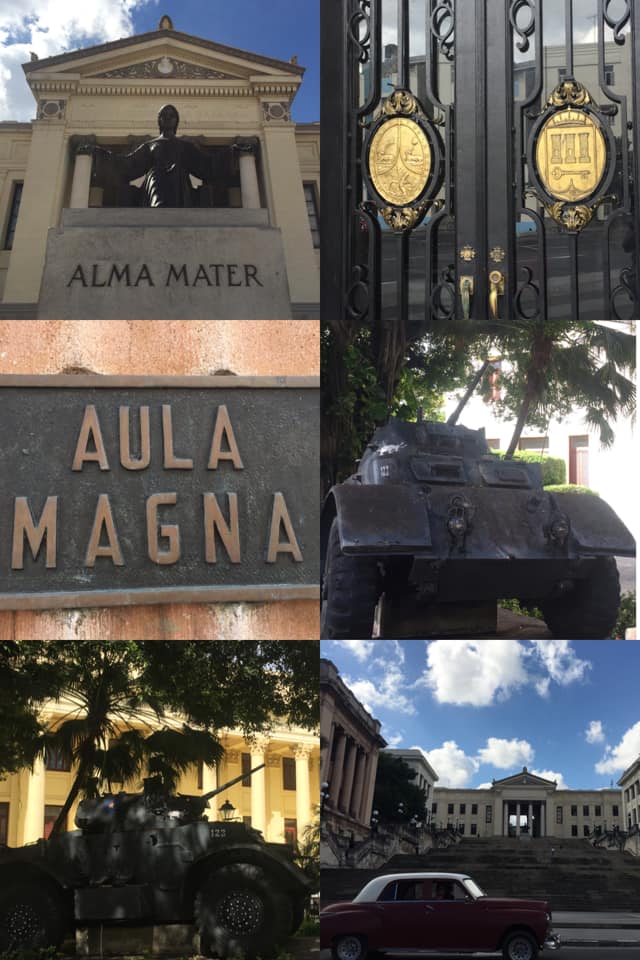

Natürlich sind wir nicht nur mit interessanten Eindrücken, sondern auch mit neuen spannenden Themen zurückgekommen.
Wer also noch ein Thema (z.B. für die Masterarbeit) sucht, sollte in den nächsten Sprechstunden vorbeischauen oder uns einfach darauf ansprechen.
16. November 2019
von LS
Kommentare deaktiviert für A contrastive analysis of DISABILITY frames in English, French, Spanish and Portuguese online publications of the World Health Organization
Looking forward to The World Congress of Applied Linguistics „The dynamics of language, communication and culture in a changing world“ in Groningen, Netherlands, where I will talk about „A contrastive analysis of DISABILITY frames in English, French, Spanish and Portuguese online publications of the World Health Organization“.
Abstract:
Framing is defined as the means by which formation is organized, presented and interpreted. The World Health Organization, WHO is the United Nations coordinating authority for international public health. Its central task is to develop, standardize and globally enforce guidelines, standards and methods in health-related areas. Through its publication, it also significantly determines the way DISABILITY is reported in associated institutions or in the media. The repeated exposure to these frames activates and engrains a set of interpretations and might therefore have an impact in the public perception of DISABILITY.
The present study focuses on explicit and implicit frames that are used to describe the concept of DISABILITY in the multilingual texts published online on the WHO website.
In addition to the “World report on disability” (350-400 pages), which is published in English, French, Spanish and Portuguese, bilingual publications such as the “WHO Global Disability Action Plan 2014-2021” and topic- and country-specific articles are also analyzed in order to identify similarities and differences between the individual languages. The talk will tackle the following point: a) are different languages using different frames for DISABILITY, b) can a difference between the frames used for mental and physical disabilities be stated/identified and c) to which extend do these official reports prevent or foster a possible stigmatization of disabled people/persons.

15. November 2019
von LS
Kommentare deaktiviert für When hashtags give the courage to speak up: language and women’s empowerment on social media
Panel at the Annual conference of the Institute for Social Movement Studies – Social Movements in the Digital Age (Berlin) / Jahreskonferenz des Instituts für Protest- und Bewegungsforschung – Hashtags, Tweets, Protest: Soziale Bewegungen im digitalen Zeitalter, Weizenbaum-Institut Berlin
Language plays a crucial role in women’s empowerment, since it can influence the power women have in relation to colleagues, partners, and other people in society.
Especially hashtags have proven potential for mobilizing worldwide attention and accountability to women’s rights by increasing the visibility of several issues that are commonly under-reported. The use of hashtags has helped tremendously to bring several issues that negatively affect women to the forefront of political agendas.
Hashtags are an adequate tool for women to create a space to exchange knowledge and information about their rights, to find supporters in their fight for gender equality and also to share their experiences and to report violence.
In our panel, we will discuss the different aspects concerning the following hashtags or language specific variations of these hashtags: #metoo, #50/50by2020, #womenempowerment, #genderequality or #heforshe, among others.
Stefanie Ullmann (Cambridge University): HashtagActivism as a Form of Counter Speech: The Case of #MeToo
Lorella Viola (Utrecht University): Let’s take a selfie! When social media increase political participation: #GaiaeMatilde, Salvini, and the LGBT community
Annamária Fábián (Universität Bamberg): The #MeToo-Discourse on Twitter in Germany as a protest for gender equality
Liane Ströbel , Francesca Capacchietti, Tobias Gretenkort, Carmen Ibáñez Berganza, Helene Pohlkamp (RWTH, Aachen): Women’s empowerment via French, Spanish, Italian and Swedish variations of #metoo
Background story: From an idea to something we talked about in our doctoral colloquium to the panel!

For more information: https://protestinstitut.eu/tag/jahrestagung/ #ipb19

10. Oktober 2019
von LS
Kommentare deaktiviert für Erasmus Dozentur in Murcia
Diese Woche unterrichte ich im Rahmen der Dozenten Mobilität an unserer Partneruniversität in Murcia am Campus La Merced.
Neben Kursen mit kontrastivem Fokus zu den Themen Präpositionen und Stereotypen, werde ich auch zwei Vorträge in der Philosophische Fakultät und an der internationalen Sprachschule auf Einladung von Dr. Ana Mansilla Perez, Präsidentin von AMUDAL, halten, die sich auch mit sprachtypologischen Unterschieden beschäftigen:
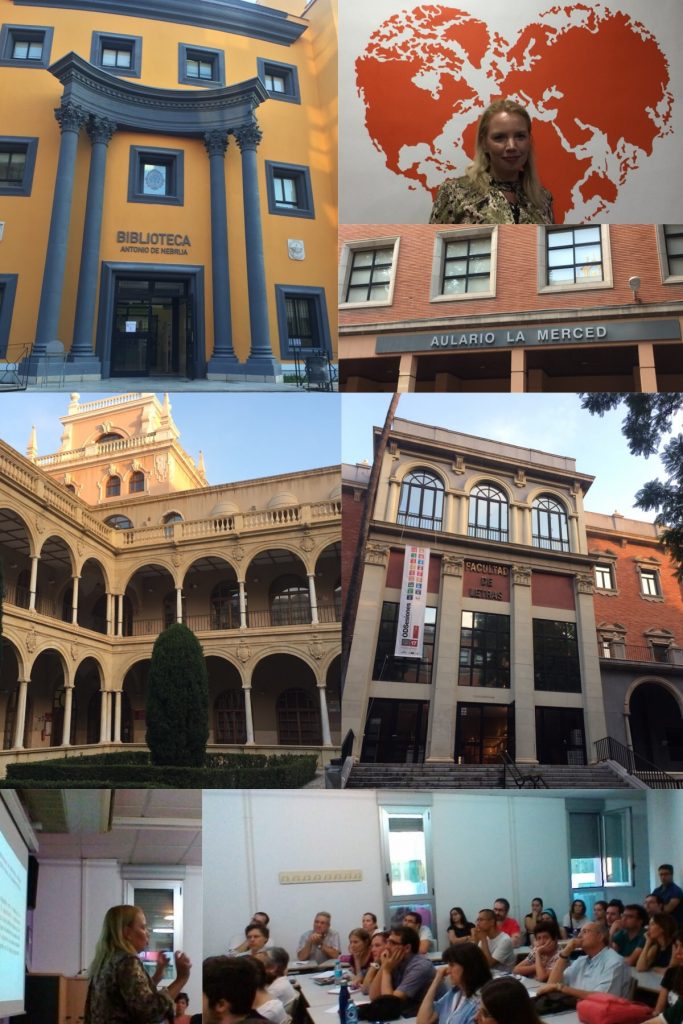
1. Oktober 2019
von LS
Kommentare deaktiviert für Le munegascu

Diese Woche bin ich mit dem Vortrag „Le munegascu – dialecte, variété ou langue-pont /Monegassisch – Dialekt, Varietät oder Brückensprache?“ auf dem XXVI. Romanistentag in Kassel.
13. September 2019
von LS
Kommentare deaktiviert für Linguistic survey – Your participation is highly appreciated!
We would be most grateful if you could spare 4 to 6 minutes of your time to complete our survey (https://ww3.unipark.de/uc/psalge_RWTH_Aachen/ef2c/), which is part of an interdisciplinary research project conducted at RWTH Aachen University, Germany.
10. September 2019
von LS
Kommentare deaktiviert für The use of sensorimotor-based concepts during and after presidential campaigns – Emmanuel Macron and Donald Trump
Abstract:
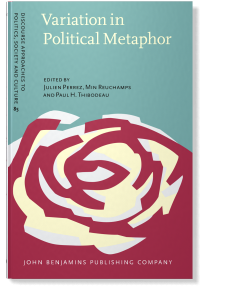
Mein neuer Artikel:
„The use of sensorimotor-based concepts during and after presidential campaigns: Emmanuel Macron and Donald Trump“ p. 131-150, ist erschienen in:
J. Perrez, M. Reuchamps & P. H. Thibodeau (eds.). Variation in Political Metaphor. Discourse Approaches to Politics, Society and Culture 85, Amsterdam/Philadelphia: John Benjamins.
Sensorimotor-based concepts (SBCs), a variation of political metaphors, are frequently used in political discourse. The particular challenge with these kinds of metaphors is that for a long time they have kept a low profile. SBCs are basic level concepts and can be used, not only frequently, but also iteratively to convey a subliminal story line. The present paper seeks to call attention to SBCs and to the extent to which this subgroup of metaphors orchestrates a wide range of precise, persuasive functions, by discussing differences in their usage during the French and U.S. presidential campaigns; in particular, in the speeches of Emmanuel Macron and Donald Trump before and after their respective election.
10. September 2019
von LS
Kommentare deaktiviert für Le jaune de la discorde – Emmanuel Macron et les mouvements identitaires face à la crise des Gilets jaunes
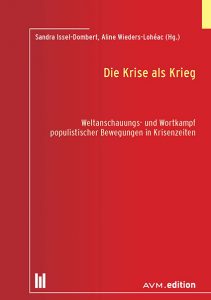
Mein Artikel „Le jaune de la discorde – Emmanuel Macron et les mouvements identitaires face à la crise des Gilets jaunes“ (p. 87-106) ist erschienen in:
Issel-Dombert, S. and A. Wieders-Lohéac (Eds.). Die Krise als Krieg. Weltanschauungs- und Wortkampf populistischer Bewegungen in Krisenzeiten, München: AVM.
Textausschnitt (p.88) :
„A l’origine, les manifestations étaient dirigées contre le gouvernement d’Emmanuel Macron. Mais avec le temps cette protestation verticale (Decker 2006), par sa hiérarchie peu claire et ses formulations en partie vagues, s’est transformée aussi en une protestation horizontale. Le thème de l’immigration qui n’a pas joué un rôle primordial au début a été de plus en plus introduit dans le débat. On peut maintenant spéculer dans quelle mesure le mouvement a été infiltré. Dans la presse, mais aussi au sein du gouvernement, les Gilets jaunes ont été décrits comme des « militants aguerris »(Bonelli 2019) qui n’ont même pas peur de « casser et tuer » (Goosz 2018), ce qui ne correspond pas tout à fait à l’image initiale du mouvement pacifique en question, mais témoigne de profonds changements internes.
D’un point de vue linguistique, ce mouvement reste difficile à analyser, car de vrais dirigeants étaient longtemps absents ou agissaient en secret, il s’agit d’un mouvement qui « n’appartient à personne et à tout le monde. Il est l’expression d’un peuple qui, depuis quarante ans, se voit dépossédé de tout ce qui lui permettait de croire à son avenir et à sa grandeur » (Halimi 2019).
Puisqu’une approche directe en analysant des discours des Gilets jaunes au moment de la rédaction de cet article ne semble pas possible, la crise actuelle en France sera examinée dans cette contribution sous deux angles : d’une part, nous nous pencherons sur les stratégies linguistiques d’appropriation d’une crise par les courants populistes de l’extrême droite, d’autre part nous analyserons les réactions du président français Emmanuel Macron face à ce grand défi.“
8. Juli 2019
von LS
Kommentare deaktiviert für Le pouvoir du bleu / The Power of the Color Blue
Appel à communication (Rieger/Ströbel) – Frankoromanistentag 2020, Transversale Sektion 23, 23.09-26.09.20; Wien

Aucune autre couleur ne (re)présente une telle diversité d’utilisation. Aucune autre n’éveille autant d’associations ni ne permet des niveaux d’interprétation aussi différents.
D’un point de vue diachronique, nous nous interrogerons sur l’évolution du bleu – introduit tardivement dans la langue française comme emprunt au bas francique blāo – du Moyen Âge à nos jours et sur son pouvoir actuel. Notre cheminement nous mènera du bleu royal au bleu de l’Europe.
Au plan synchronique, nous analyserons le vaste champ associatif lié à cette couleur, en partant des collocations, des expressions idiomatiques et des locutions, à travers son rôle dans la publicité, le marketing, le cinéma et l’art du XXIe jusqu’à sa fonction de symbole comme maillot national de l’équipe de France ou drapeau européen.
Au niveau diatopique, le bleu couleur de la mer désigne non seulement un espace profondément symbolique, mais aussi un carrefour culturel et linguistique, celui de la Côte d’Azur, avec les peintres impressionnistes d’abord, les exilés des guerres ensuite, puis les fans du cinéma qui se sont rencontrés dans cette enclave de plusieurs langues romanes avec leurs variétés dialectiques.
Face à ces diverses apparentés ou facettes, il est légitime de s’interroger : comment d’une part le bleu est-il arrivé à devenir le logo de l’entreprise Europe ? Et quel est d’autre part son pouvoir d’intégration ? Ces questions nous amènent à formuler l’hypothèse suivante : Les couleurs et leur symbolisme sont liés aux civilisations et à leurs identités culturelles. Et le bleu y a des valeurs certaines ainsi qu’un pouvoir particulier. Est-ce ce pouvoir du bleu qui contribuera à unir l’Europe ? Comment et pourquoi ? Notre approche interdisciplinaire a pour but de mettre l’accent sur les points de vue culturel, linguistique, littéraire et artistique à propos de cette couleur qui a fini par être sélectionnée pour représenter l’idée et l’union européennes.
Nous faisons donc appel à des linguistes, des littéraires, des historiens et historiens de l’art dans le dessein de contribuer par leurs réflexions générales ou ponctuelles à une meilleure connaissance du bleu au carrefour des idées et pour répondre donc à ces diverses questions.
The Power of the Color Blue
No other color is so versatile. No other brings about so many associations or allows such different levels of interpretation.
We will first take a look at the evolution of the word blue, which was introduced belatedly into the French language as a loan from the Lower Franconian blao — from a diachronic perspective, starting in the Middle Ages and ending in the present day. Our journey to understand the origins of its power will take us from the ‘royal blue’ to the ‘European blue’.
At the synchronic level, we will analyze the vast associative field linked to this color, starting with collocations, idiomatic expressions and locutions, continuing with its role in advertising, marketing, cinema and the arts of the 21st century and ending with its symbolic function as the color of France’s national football team and of the European flag.
At the diatopic level, the color of the sea rules not only over a deeply symbolic space, but also over a cultural and linguistic crossroad of several Romance languages: the Côte d’Azur, an enclave for impressionist painters and exiles from WW I and WW II. Nowadays, the region has become one of the top meeting places of the international film industry.
Considering all these interrelated aspects, it seems legitimate to raise the following questions: How did the color blue become the logo of Europe? What is its integrative power? These questions have led us to formulate the following hypothesis: Colors and their symbolism are linked to the cultural identity of every civilization, the color blue being especially important and powerful. Will this inherent power of the color blue contribute to European unity? How and why? Our aim is to discuss, from an interdisciplinary point of view, the cultural, linguistic, and artistic meaning of the color blue, which represents Europe as an idea and as a political union.
We therefore call on linguists, literary scholars, historians and art historians to send their proposals and join us in our reflections so that we can gain a better understanding of the color blue in its multiple facets and find answers to our questions.
4. Juni 2019
von LS
Kommentare deaktiviert für The Impact of Sensorimotor-based Concepts in the French Press Coverage of the Refugee and Migrant Crisis in the EU (2015-2018)
Diese Woche bin ich in Brüssel auf der 2nd Biennial „EU in European Affairs“ Conference mit dem Thema «CONTROVERSIAL APPROACHES TO EUROPEAN SOLIDARITY – FROM BURDEN SHARING TO INTEGRATION» eingeladen, um meine Analyse zu „The Impact of Sensorimotor-based Concepts in the French Press Coverage of the Refugee and Migrant Crisis in the EU (2015-2018)“ zu präsentieren.
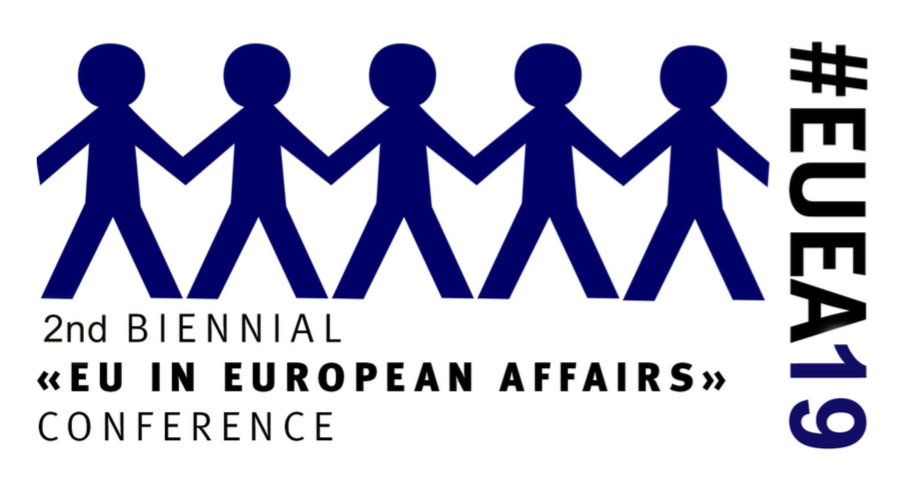
7. Mai 2019
von LS
Kommentare deaktiviert für Theoretische Überlegungen zur Visuellen Grammatik
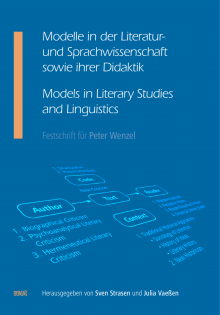
Unser Artikel „Theoretische Überlegungen zur Visuellen Grammatik“ ist in der Festschrift für Peter Wenzel erschienen:
Ballero Flores, V. & Ströbel, L. (2019). Theoretische Überlegungen zur Visuellen Grammatik. In S. Strasen und J. Vaeßen (Hg.). Modelle in der Literatur- und Sprachwissenschaft sowie ihrer Didaktik. Models in Literary Studies and Linguistics, 163-185. Trier: WVT.
Weitere Informationen hier:
Visuelle Grammatik, Visual Grammar, Gramática Visual, Grammaire Visuelle, Grammatica Visivia, ВИЗУАЛЬНАЯ ГРАММАТИКА
26. März 2019
von LS
Kommentare deaktiviert für The Impact of Sensorimotor-based Concepts on the Result of the Brexit Referendum
Diese Woche bin ich auf Konferenzen in Berlin und Oxford, u.a. mit dem Thema „Kann ein Wort die europäische Geschichte verändern?“.

Weitere Informationen (u.a. Bibliographie & Quellenangaben) per Email.
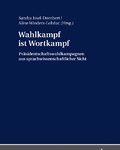
3. Januar 2019
von LS
Kommentare deaktiviert für Sensomotorische Konzepte – Simulationsstrategien im französischen Wahlkampf
Mein Artikel „Sensomotorische Konzepte – Simulationsstrategien im französischen Wahlkampf“ (S. 249-268) ist, in dem von Sandra Issel-Dombert und Aline Wieders-Lohéac herausgegebenen Band „Wahlkampf ist Wortkampf – Präsidentschaftswahlkampagnen aus sprachwissenschaftlicher Sicht“, erschienen.
„Wahlkampf ist Wortkampf: In Reden, auf Plakaten, in Werbespots, Talkshows und Interviews, online oder auf der Straße – überall versuchen die Parteien und Kandidaten in Präsidentschaftswahlkämpfen mittels der persuasiven Kraft des Wortes Wählerstimmen und damit politische Macht zu erhalten. Der Band widmet sich Wahlkämpfen als Wortkämpfen aus Sicht zweier Forschungsbereiche, die aktuell einen dynamischen Aufschwung erleben: Diskursanalyse und Politolinguistik. Er vereint Beiträge, die das Besondere moderner Präsidentschaftswahlkämpfe ausleuchten und so Einblick geben in Wahlkampfkommunikation des 21. Jahrhunderts allgemein, mit solchen, die das Grundsätzliche moderner Wahlkämpfe und ihrer Diskurse analysieren und so zur Erklärung des Spezifischen von Präsidentschaftswahlkämpfen beitragen.“
In meinem Artikel geht es vor allem um indirekte (und teilweise unbewusste) Beeinflussung der potentiellen Wähler mit Hilfe sensomotorischer Konzepte, vgl.:
« Les métaphores et les métonymies sont un outil important du discours politique car elles contribuent à transmettre un grand nombre d’informations de manière succincte, d’aborder des thèmes complexes en les transformant en ensembles simplifiés et en déterminant des schémas, auxquels le public peut répondre. Le présent article a pour but d’attirer l’attention sur les cadres sensori-moteurs, les images mentales et les liens conceptuels. »

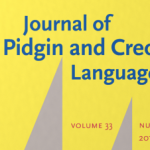
14. November 2018
von LS
Kommentare deaktiviert für Review in Journal of Pidgin and Creole Languages
Hier ein Auszug:
„(…) this volume offers fresh perspectives on, along with new and rich linguistic data from, Portuguese- and Spanish-based creoles. The studies are accessible, well written, and highly insightful, for the most part. As such, The Iberian Challenge: Creole languages beyond the plantation setting constitutes recommended reading for all interested in language contact, language use, and language change, and required reading for those who are interested in seeing the richness of insights that creoles offer for theories of language variation/change, psycholinguistics, and pragmatics.“ (p.451)
Weitere Rezensionen unter: hier




15. Oktober 2018
von LS
Kommentare deaktiviert für Eindrücke vom Human Brain Project Summit, Maastricht
Humain Brain Project Summit: https://www.hbpopendaysummit-2018.org/,
Human Brain Project: https://www.humanbrainproject.eu/en/,
The European Institute for Theoretical Neuroscience: https://www.eitn.org/
(Fotos vom Science Market)



12. Oktober 2018
von LS
Kommentare deaktiviert für Los pretéritos simple y compuesto en la América hispana colonial – Un estudio aspecto-temporal a través del corpus CORDIAM entre 1494 y 1699
Meine jetzt ehemalige 😉 Doktorandin, Helene Pohlkamp, hat heute ihre Disputatio u.a. im Beisein von Angelica Rieger, Simone Paganini und unserem Gast Jaume Mateu (Universitat Autònoma de Barcelona) erfolgreich abgelegt.

Das Thema ihrer Dissertation „Los pretéritos simple y compuesto en la América hispana colonial – Un estudio aspecto-temporal a través del corpus CORDIAM entre 1494 y 1699″ hatte sie schon auf der LingUnite präsentiert.
22. September 2018
von LS
Kommentare deaktiviert für Die Krise als Krieg: Weltanschauungs- und Wortkampf populistischer Bewegungen in Krisenzeiten
Michel Favre und ich werde zwei Vorträge in der Sektion „Die Krise als Krieg: Weltanschauungs- und Wortkampf populistischer Bewegungen in Krisenzeiten“ (Sektionsleitung: Sandra Issel-Dombert und Aline Wieders-Lohéac, beide Universität Kassel) während des 11. Frankoromanistenkongresses „Krieg und Frieden. Zur Produktivität von Krisen und Konflikten“ in Osnabrück (26.-29.09.18) halten, nämlich
Weisen die Reden von Emmanuel Macron populistische Merkmale auf? (Michel Favre)
Neurokommunikation im politischen Diskurs (Liane Ströbel) [Abstract]
Auszug der Sektionsbeschreibung:
„Krisen haben ihre eigene Sprache. Krisen spiegeln sich in Sprache. Krisen entstehen durch Sprache. (…) Die Krise ist dabei – auch in der Sprache – die Gegenspielerin der Kontinuität. Sie ist eine Zeit der erzwungenen Transformation und damit des Kampfes konkurrierender Gesellschaftserzählungen.
Aus diskurslinguistischer Sicht ist sie eine Periode des Weltanschauungs- und Wortkampfes, die sich zwischen zwei Perioden des gesellschaftlichen und sprachlichen Friedens schiebt. (…) Als Zuspitzung, als Wendepunkt, als Entscheidung ist die Krise ein Kampf um Deutung, Bedeutung und Umdeutung und damit das zeitlich-räumliche Terrain der Populisten, die in der Krise ihre Chance sehen und den sprachlichen Kampf am radikalsten führen. Sie fordern nicht nur Transformation, sondern den vollständigen Bruch mit den alten Erzählungen und mitunter dem sprachlichen Konsens. (…)“
Aus diskurs- und politolinguistischer Perspektive werden folgende Fragen diskutiert:
– Wie wird der Kampf um die Worte, der Krieg gegen das Establishment in der Krise geführt?
– Wie werden Begriffe neu gedeutet bzw. umgedeutet?
– Welche Vorstellungen vom Davor und Danach der Krise konkurrieren in den jeweiligen Bewegungen?
– Wie verändert der Populismus in der Krise Sprache und Diskurse?
– Wie konstruieren Populismus und Extremismus die Krise und ihre Überwindung?
– Wie unterscheiden sich unterschiedliche populistische Ansätze bzw. verschiedene populistische Agenten in derselben Krise in ihren Diskursen?
– Wie reagiert das Establishment auf den Kampf, zu dem es sich von den Populisten herausgefordert sieht?
Weitere Informationen: https://www.frk.uni-osnabrueck.de/sektionen/

11. September 2018
von LS
Kommentare deaktiviert für Darf man Populisten eine Plattform gewähren?
Diese Frage wurde auch auf der 75. Biennale von Venedig an den Regisseur Errol Morris gestellt.
In seinem Film „American Dharma“ (dharma < Sanskrit धर्म, ursprünglich mit Ethik und Moral assoziiert), einem Film mit und über Steve Bannon, versuchte er die Denkweise des Ex-Beraters von Donald Trump zu ergründen.
Auf die Vorwürfe, dem Populisten durch seinen Dokumentarfilm eine zusätzliche Plattform eröffnet zu haben, kontert Errol Morris, dass er auch lange abwägen musste, für ihn aber Schweigen keine Alternative gewesen sei.
Populisten stehen sowieso im Zentrum des Medieninteresses, daher sei es auch legitim gewesen, diesen Film zu drehen, um Steve Bannon und seine Motivationen besser zu verstehen.
Dies sei vor allem wichtig, da Populismus kein vorübergehendes Phänomen sei, sondern sich durch die Jahrhunderte zieht.
In diesem Sinne werden wir, Ludwig Deringer und ich (als Herausgeber, aber auch Autoren) das Thema „Populismus“ in einem eigenen Band (aus verschiedenen Perspektiven und auf mehreren Kontinenten) betrachten.
Voraussichtliches Erscheinungsdatum des Buches: 2019.

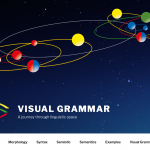
22. August 2018
von LS
Kommentare deaktiviert für VISUAL GRAMMAR – A journey through linguistic space (Englisch, Deutsch, Spanisch, Französisch, Italienisch, Russisch)
Nachdem die „Visuelle Grammatik“ offiziell als Erfindung angemeldet wurde, stehen wir jetzt in den Startlöchern für die nächste Phase:
(Englisch, Deutsch, Spanisch, Französisch, Italienisch, Russisch)

Mehr bald auf www.visualgrammar.eu!
2. Juli 2018
von LS
Kommentare deaktiviert für Medieninteresse zum Vortrag „Miedo en 140 caracteres: dos estudios en Twitter tras los ataques terroristas en la revista ‚Charlie Hebdo‘ y en la ciudad de Barcelona“ (Castro/ Esteve/Gretenkort)
Zusammen mit Francisco Javier Castro Toledo und Miriam Esteve Campello (beide vom Centro Crímina para el estudio y prevención de la delincuencia, de la Universidad Miguel Hernández de Elche) hat Tobias Gretenkort, Doktorand im Lehr-und Fachbereich Romanische Sprachwissenschaft, auf dem XII Congreso Español de Criminología in Oviedo den Vortrag „Miedo en 140 caracteres: dos estudios en Twitter tras los ataques terroristas en la revista ‚Charlie Hebdo‘ y en la ciudad de Barcelona“ gehalten.
Folgende Artikel sind dazu in der Presse erschienen:
„Criminólogos estudian la difusión del miedo al crimen en 140 caracteres“ (La Vanguardia, 1.7.2018)
„Criminólogos estudian la difusión del miedo al crimen en 140 caracteres“ (abc.es, 1.7.2018)
Los criminólogos ponen sus ojos en Twitter – Un estudio presentado en Oviedo refleja que esta red social es «un difusor efectivo de miedo al crimen», sobre todo en caso de atentados (La voz de Asturias, 1.7.2018)
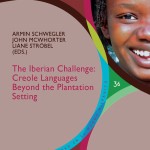
12. Juni 2018
von LS
Kommentare deaktiviert für The Iberian Challenge: Creole Languages Beyond the Plantation Setting (Reviews)
Hier einige Links zu den Reviews von:
The Iberian Challenge: Creole Languages Beyond the Plantation Setting ed. by Armin Schwegler, John McWhorter, and Liane Ströbel
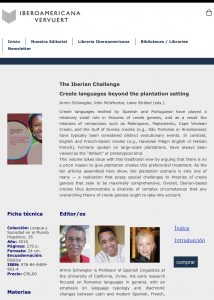
Reviews:
https://muse.jhu.edu/article/691868
http://media.voog.com/0000/0034/5140/files/4%20Smith%20Rev%20Schwegler.pdf
…
1. Juni 2018
von LS
Kommentare deaktiviert für TALLER (Workshop) VISUALIZACIÓN SINTÁCTICA
Una „Gramática Visual“ Taller (Workshop) sobre
Taller (Workshop) sobre
VISUALIZACIÓN SINTÁCTICA – examen crítico de un proyecto lingüístico –
Departamento de Lingüística Románica de la Universidad de Aquisgrán, Alemania,
del 5 al 7 de junio de 2018
Junto con la participación de un grupo de estudiantes de la Universidad de Murcia encabezados por la profesora Ana Belén Mansilla Pérez, intentaremos poner a prueba un modelo sintáctico gráfico que hemos desarrollado en el Departamento de Lingüística Románica de la Universidad Técnica de Aquisgrán. Su examen crítico apunta fundamentalmente al análisis del potencial didáctico y cognitivo en la labor contrastiva de las sintaxis española y alemana. En nuestro Departamento, y en la búsqueda de facilitar la comprensión de las funciones sintácticas de la lengua, hemos recurrido a la potencialidad didáctica encerrada en la visualización gráfica. La diferencia con otros modelos gráficos no está en el uso clásico de líneas, formas, colores, etc., sino en la „metafórica cósmica“ a la cual subyace el análisis sintáctico propuesto. Estrellas y planetas nos acercan (en tres diferentes niveles) a las funciones de los diferentes sintagmas en el proceso comunicativo.
Vicente Ballero Flores y Liane Ströbel (Organizadores del taller) con el patrocinio del

Más información: aquí
21. Mai 2018
von LS
Kommentare deaktiviert für #MeToo, #5050by2020, #TimeIsUp, etc.
Zurück aus Frankreich mit neuen Ideen. Höchste Zeit, das Thema #MeToo, #5050by2020, #TimeIsUp, etc. auch aus kontrastiver Sicht zu untersuchen.

Bilder von der Diskussionsrunde Take Two: Next moves for #MeToo mit u.a. Alice Bah Kuhnke (Ministerin für Kultur und Demokratie ?? ), Françoise Nyssen (Kulturministerin ?? ), Marlène Schiappa (Staatssekretärin für die Gleichstellung der Geschlechter ??), Dr. Stacy L. Smith (Gründerin Tannenberg Inclusion Initiative, University of Southern California ??), Eva Röse (Schauspielerin ?? /Mitglied von #tystnadtagning), etc.
Für eine Themenbesprechung für Bachelor-,Master- & Doktorarbeiten, kommen Sie bitte in meine Sprechstunde.
Weiterführende Lektüre:
Manikonda, L., Beigi, G., Liu, H., & Kambhampati, S. (2018). Twitter for Sparking a Movement, Reddit for Sharing the Moment: #metoo through the Lens of Social Media. CoRR, abs/1803.08022.
Lindqvist, L. (2017). The Woman Was Raped. A Critical Discourse Analysis of Swedish News Media Coverage of Rape and Sexual Assault. Master Thesis. Lund University.
21. Mai 2018
von LS
Kommentare deaktiviert für Emmanuel Macron an der RWTH Aachen – Beiträge von Studierenden der Romanistik
Wir würden gerne auf der Homepage des Instituts für Anglistik, Amerikanistik und Romanistik eine Seite für Beiträge (z.B. Interviews, Selfies, etc.) von Studenten anlässlich des Besuchs von Emmanuel Macron an der RWTH zur Verfügung stellen.
Bitte schicken Sie Ihre Links & Fotos an Frau Eva Kunert !
Damit Sie schon einmal eine Vorstellung bekommen, hier ein kleiner Vorgeschmack:
Eindrücke des Besuchs des französischen Staatspräsidenten von unsere Studentin Stefanie Lukowski (Selfie unten links) auf der Instagramseite der RWTH
Hannah Janßen (ab März 2019 Doktorandin im Fachbereich Romanische Sprachwissenschaft) stellt Emmanuel Macron eine Frage (Bild unten rechts!)
Weitere Fotos & Berichte unserer Studenten demnächst auf der Instituts-Homepage!

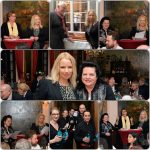
25. März 2018
von LS
Kommentare deaktiviert für Romanistischer Beitrag zum Rahmenprogramm der Verleihung des Internationalen Karlspreises zu Aachen an Emmanuel Macron
I. Innerhalb des offiziellen Rahmenprogramms:
Fünf-Gänge-Menü von Christof Lang & kommentierte zweisprachige Lesung aus Macrons markantesten Reden und seinem Buch „Révolution“ präsentiert von Angelica Rieger und Liane Ströbel:
12.04.1018, 19 Uhr, Festsaal Couven-Museum

Foto: A.Rieger/A. Schmitter
II. Zusätzliche Veranstaltung des Instituts für Romanistik
Vortrag des Autors, Historikers, Philosophs und akademischen Lehrers von Emmanuel Macron
Französisch, mit dt. Übersetzung, 19.04.2018 in B8/9, Institut für Romanistik, Kármánstr. 17-19
François Dosse ist Autor, Historiker, Philosoph und akademischer Lehrer von Emmanuel Macron. Er ist Professor für Geschichte der Gegenwart am Institut Universitaire de Formation des Maîtres (IUFM) und lehrt am Institut d’études politiques de Paris.
In seinem Vortrag (mit deutscher Übersetzung) begeben wir uns auf eine Art Spurensuche. Wie viel Philosoph steckt in Emmanuel Macron? Wie stark hat ihn seine Assistenzzeit bei Paul Ricœur beeinflusst? Welche Auswirkung hat diese Prägung auf seine Politik?
Im Anschluss an den Vortrag steht François Dosse auch für Fragen zur Verfügung.
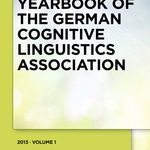
20. Januar 2018
von LS
Kommentare deaktiviert für Can Macromania be explained linguistically? Beneath the morphological boundary: A sketch of subconscious manipulation strategies in Emmanuel Macron’s political discourses
My new article is now available online:
This contribution focuses on the close link between perception and language. The analysis will extend beyond morphological evidence to include the role of submorphological relics. It will also raise the question of whether sensorimotor and submorphemic knowledge might have an impact on political discussion. In short, this paper seeks to tackle the question: How aware are we that words and sounds in general and in political discourse in particular are never ‘innocent’?

11. Januar 2018
von LS
Kommentare deaktiviert für The linguistic influence of perceptual and conceptual parameters
Kurz vor der Weihnachtspause ist noch folgender Artikel erschienen:
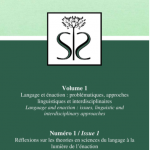
22. November 2017
von LS
Kommentare deaktiviert für How submorphological relics of perceptual parameters still influence synchronic use and may have had an impact on recent presidential elections
Gerade erschienen:
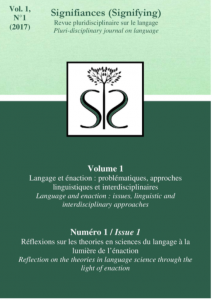 Stroebel, Liane S. (2017). How submorphological relics of perceptual parameters still influence synchronic use and may have had an impact on recent presidential elections. Signifiances (Signifying), Volume 1; n°3, 151-169.
Stroebel, Liane S. (2017). How submorphological relics of perceptual parameters still influence synchronic use and may have had an impact on recent presidential elections. Signifiances (Signifying), Volume 1; n°3, 151-169.
This contribution focuses on the close link between sensorimotor actions and language. The interaction between perceptual and conceptual parameters will be illustrated in detail and from different perspectives via specific examples. Furthermore, the analysis will extend beyond morphological evidence to include the role of sub morphological relicts of perceptual and conceptual parameters. It will also raise the question of whether submorphemic knowledge might have had an impact on the United States presidential election and helped Donald Trump to become the 45th President of the United States. In short, this paper seeks to tackle three questions: first, how aware are we that words are never „innocent“, second, how transparent are words, and finally, is it possible to sketch semantic mappings from the initial encoding strategies on to the synchronic „power“ of a given word.
Perceptual Parameters, Conceptual parameters, Concepts, Source domain, Submorphemes
La présente contribution traite du lien étroit entre les actions sensorimétriques et notre langue. L’interaction entre les paramètres perceptuels et conceptuels sera illustrée en détail et à l’aide d’exemples spécifiques à travers différentes perspectives. L’analyse ne s’arrêtera pas aux éléments morphologiques des paramètres susdits; elle traitera également leurs aspects phonétiques et posera la question de savoir si les connaissances submorphologiques ont pu avoir un impact sur les résultats de l’élection du 45ème président des Etats-Unis. Dans cet article, il s’agira également de trouver des réponses à trois autres questions: premièrement, est-on conscient du fait que les mots ne sont jamais innocents ? Deuxièmement, quel est le degré de transparence synchronique d’un mot? Et finalement, est-il possible d’illustrer les réseaux sémantique et conceptuel à partir des domaines sources et jusqu’aux domaines cibles pour montrer le „pouvoir“ d’un mot.
Paramètres perceptuels, Paramètres conceptuels, Concepts, Domain Source, Submorphèmes
20. November 2017
von LS
Kommentare deaktiviert für Sensorimotor-Based Action Words Speak Louder Than (non Sensorimotor-Based) Words
Diese Woche bin ich auf der 7th International and Interdisciplinary Conference on Applied Linguistics and Professional Practice (ALAPP7) des Research Centre for Multilingual Practice and Language Learning in Society an derUniversität von Ghent (Belgien) mit dem Vortrag „Sensorimotor-Based Action Words Speak Louder Than (non Sensorimotor-Based) Words“.
Das Thema der Konferenz lautet: Communication, Interaction & Quality of Service
Die Sektion: „Speaking to the Gut: How Emotive Language Is Conquering Public Communication“
Im Anschluss an die Konferenz bin ich auch noch auf einem Projektreffen mit dem Thema:
„The obesity epidemic as a linguistic challenge: Pathways towards information optimization“
Out now:
González-Márquez, M., Feist, M., & Ströbel, L. (2017). Converging on a theory of language through multiple methods. Behavioral and Brain Sciences, 40. doi:10.1017/S0140525X17000383
https://www.cambridge.org/core/journals/behavioral-and-brain-sciences/article/converging-on-a-theory-of-language-through-multiple-methods/7E5028E06362EF30040FCA818C56C219
28. Oktober 2017
von LS
Kommentare deaktiviert für La comunicazione Neuro-Linguistica nella Politica: La Macromania – esiste una spiegazione (Neuro-)linguistica?
Am 27.10.17 war ich auf Einladung von Prof. Dr. Daniela Marzo an der LMU in München mit dem Vortrag:
La comunicazione Neuro-Linguistica nella Politica -La Macromania – esiste una spiegazione (Neuro-)linguistica?

19. Juli 2017
von LS
Kommentare deaktiviert für Verknappungsphänomene in Sprache, Kultur und neuen Medien
Verknappungsphänomene in Sprache, Kultur und neuen Medien – Reduktion als funktionales Instrument und zeitgenössisches Stilmittel
Im Mittelpunkt der Untersuchung steht die Frage, inwieweit Verknappung bewusst als funktionales Instrument und zeitgenössisches Stilmittel in Sprache, Kultur und neuen Medien eingesetzt wird.
Der Sammelband untersucht das Phänomen der Verknappung zunächst als Strategie in der digitalen Welt, der Werbung und der graphischen Kommunikation und anschließend
als Stilmittel in Kunst, Literatur und Sprache.
Die Beiträger heben die Rolle von Verknappung als Nährboden für neue Komprimierungsprozesse hervor und zeigen übergreifend unterschiedliche Realisierungen von Verknappung in der modernen Gesellschaft auf.
Inhaltsverzeichnis:
I. Verknappungsstrategien in der digitalen Welt und der Werbung
II. Verknappungsstrategien in der dynamischen und statischen Kommunikation
III. Verknappung als Stilmittel in Literatur und Sprache
Die Vorlesung ist jetzt online und umfasst folgende Bereiche (jeweils 90min):
Zugangscode und Passwort nur per persönlicher Anmeldung!
31. Mai 2017
von LS
Kommentare deaktiviert für L‘usage ad hoc des verbes haptiques et des submorphemes en /pr-/ dans les discours politiques d‘Emmanuel Macron (Aflico7)
Nach FIF70 und einem Besuch der Académie des Langues Dialectales, bin ich diese Woche auf der Konferenz AFLICO 7 Discours, Cognition & Constructions: Implications & Applications 7e Colloque International de l’Association française de Linguistique cognitive in Lüttich/Liège.
Dort nehme ich an dem Workshop „Ateliers méthodologiques (A2/4/12) – Natalia Levshina – Bayesian regression analysis with R“ teil und stelle meine beiden Vorträge vor:
Michel Favre wird „Les métaphores et les métonymies dans les discours de la Ve République, de Charles de Gaulle à François Hollande“ vorstellen.
17. April 2017
von LS
Kommentare deaktiviert für The use of haptic verbs in the French Presidential Campaign (SALC 6, Schweden)
Ich bin diese Woche auf der 6. Konferenz der Skandinavischen Gesellschaft für Sprache und Kognition in Lund, Schweden (http://konferens.ht.lu.se/salc6/). Ich stelle dort ein Teilgebiet des Themas: The role of so-called “frozen metaphors” as effective persuasive devices in political discourse (in France, Spain, and the US) und zwar: „The use of haptic verbs in the French Presidential Campaign“ vor.
17. Januar 2017
von LS
Kommentare deaktiviert für „Dumpster Fire“: International Discourses of Populism, 2015-2018
Organizers & Presiders: Ludwig Deringer, Liane Stroebel
Today populism in its manifold manifestations no doubt figures as one of the most controversial phenomena worldwide, impacting political discourses in Europe and the United States in particular. The situation of the refugees in Europe, the 2016-17 election campaigns in the United States, the Netherlands, France, and Germany, as well as Great Britain’s “Brexit”, are cases in point. The American Dialect Society voted “dumpster fire” the Word of the Year 2016, as denoting “an exceedingly disastrous or chaotic situation” and “as best representing the public discourse and preoccupations of the past year” (americandialect.org). Thus, the presiders and presenters of this Special Session argue, innovative scholarship is called for that is interdisciplinary and multilingual, one reason being that “English Is Not Enough” (Catherine Porter, 2009). Obviously, pertinent scholarship will work from the angles of linguistics, classical and contemporary rhetoric, as well as political and cultural history. The Session is directed toward students and scholars from a variety of disciplines but is nevertheless coherent in its aims and structure. One of the main aims is to clarify the distinctiveness of populism in these three countries, and to define similarities, constants, or even types of populist discourse in general. Issues and problems of content and methodology will likely make for a productive discussion. All the presiders and presenters are experienced conference co-/organizers who highly value stimulating debate, and will therefore painstakingly observe time limits.
This Session is scheduled to have two presiders for two reasons: (1) While the foci of the three papers are on Belgium, France, and Spain, the international approach calls for experts in a spectrum ranging from Romance Studies to American Studies. (2) Since the audience will likely include many native speakers from the Romania, one presider should be a specialist in Romance languages and cultures. In our perception, the discussion will benefit from this rationale. Therefore, Ludwig Deringer will moderate the presentations (18 mins. each) and enforce time limits, whereas Liane Ströbel will be leading the ensuing discussion (16 mins.). Since the three papers highlight European developments, the discussion period could function as an exchange of ideas from a Transatlantic viewpoint, exploring the applicability of European scenarios to (North) America along comparative lines. Can the various „dumpster fires“ be quenched in the foreseeable future?
Opening the Session, Julien Perrez will attempt a definition of the key term in his paper “Who Wants to Be a Populist? A Linguistic Analysis of the Use of the Lexemes ‘Populist’ and ‘Populism’ in Belgian Media Discourse”. Researchers agree on some defining characteristics of ‘populism’, such as resistance to the intellectual elite, and of ‘populist rhetoric’, such as the deictics of exclusion (De Landtsheer et al. 2016). Yet the exact meaning of ‘populism’ seems to vary according to the contexts in which it is used, thereby confirming the perception of Reineman et al. that the term is characterized by “conceptual ambiguity” (2017:12). Against this background, this paper aims (1) at unraveling the multiple meanings of ‘populism’, e.g. determining in what contexts it is used and with respect to what thematic issues, and (2) at identifying which political actors are explicitly labeled as ‘populist’ and by whom. To meet these aims, this presentation will be based on a quantitative and qualitative analysis of the occurrences of the lexemes ‘populist’ and ‘populism’ in a representative Belgian press corpus, covering the period from September 1, 2016 to June 30, 2017. The data is currently under analysis and will be presented during the Session.
Looking at Belgium’s neighboring country to the south, Aline Wieders-Lohéac will tackle “‘Enemies of the People’: Discursive Strategies of Populist Movements in the 2017 French Presidential Election Campaign”. Most modern-day populists in Western democracies, she argues, have identified two main “enemies of the people”: (illegal) immigrants and the (political) establishment (that welcomed them). Claiming that the democratically elected politicians do not represent the people’s will any longer, they challenge the political elite to react to such attacks. Consequently, two major questions arise: (1) What strategies do populist movements use to construct an ‘us’ group and differentiate it from a ‘them’ group?; (2) How does the so-challenged elite react to this attack? The situation in France is particularly interesting since the political elite is under attack not only from a right-wing party led by presidential candidate Marine Le Pen, but also from the new movement En Marche founded by the “lost son of the establishment”, Emmanuel Macron, who advocates far leftist positions.The corpus consists of speeches by the leaders of the movements, and by President Francois Hollande. Moreover, it contains extracts from various party programs. To elicit the typical argumentative structures, the topoi, this paper uses an approach from Wengeler (2003, 2007), based on Aristotle’s definition of topos. Furthermore, with the linguistic program SketchEngine, Wieders-Lohéac will analyze typical keywords and co-occurrences, so as to determine the typical structures of different levels, and to compare them to each other.
Turning south once more, Sandra Issel-Dombert examines “Populism and Crisis: The Rise of Podemos in Spain”. The aim of this contribution is to analyze the rise of the leftist “Podemos” party in Spain following the financial and banking crisis of 2008. This paper also suggests an empirical method using a press corpus compiled via the LexisNexis program. Based on the hypothesis that a linguistic point of view can provide reliable insight into the workings of a crisis discourse, this contribution will employ a data-driven approach, combining three different linguistic methods: topos analysis, keywords, and metaphors. The method of topos analysis – in the tradition of Aristotle – concerns the revelation of more or less implicit arguments in discourse. Keywords occur with a (statistically) high frequency in texts and on this basis are able to delineate characteristics of a specific period. Since Lakoff/Johnson (1980) at the very latest, metaphors have been regarded as a fruitful concept to analyze political discourse because of their ability to indicate patterns of meaning. This triangulation allows us to describe the specific “anatomy” of the crisis discourse in Spain.
Genre, Theory, Method: Rhetoric and Rhetorical Theory
Information on panelists’ and presiders’ scholarship, particularly scholarship that directly relates to the session topic
Sandra Issel-Dombert is an instructor and a doctoral candidate in Romance Linguistics at the University of Kassel. She studied French, Spanish, German and Education Studies at the University of Kassel and at Université Paris-Sorbonne (Paris IV). She earned a Teacher Diploma (Staatsexamen) and is currently at work on her doctoral dissertation in diachronic French linguistics about the linguistics of complaint as exemplified in the Cahiers de doléances. She has been the recipient of several excellence awards and scholarships. She has organized or co-organized several workshops and conferences, and presented 23 conference papers at various European universities, including University College London, the University of Stockholm, and Universidad de València. Many of her presentations were invited papers. Among her areas of research and teaching are the history of French and of Spanish, political discourse in times of populism, immigration, and terrorism, as well as the rhetoric of election campaigns. Among her forthcoming publications is an article (with Marie Serwe) on the party platform of the right-wing Front National in France under Marine Le Pen.
Aline Wieders-Lohéac also is an instructor and a doctoral candidate in Romance Linguistics at the University of Kassel. She studied Romance languages (French, Spanish, Portuguese and Italian) at Johannes Gutenberg University Mainz, Universidade Nova in Lisbon and at Sorbonne Nouvelle 3 in Paris. She earned her Teacher Diploma (Staatsexamen) in 2014 and is currently at work on her doctoral dissertation about the speeches of French politicians in reaction to terrorism („Le discours contre la terreur“). With Sandra Issel-Dombert, she presented several papers on political discourses in France and Spain, including populism, migration, and elections, and in November 2016 they organized an interdisciplinary conference on presidential election campaigns (publication of conference proceedings in progress). Aline Wieders-Lohéac has received several scholarships and excellence awards from organizations such as the German Academic Exchange Service (DAAD). Notably, she was a Fellow of the German National Merit Foundation (Studienstiftung des Deutschen Volkes).
Julien Perrez is associate professor of Dutch Linguistics at Université de Liège. His areas of research include language typology (French-Dutch), cognitive linguistics and conceptual metaphors, as well as interfaces of language and politics. In the wake of this interdisciplinary research, he has developed since 2011, with political scientist Prof. Dr. Min Reuchamps (Université Catholique de Louvain), the research group “Langue(s) & Politique(s)”, gathering 70 Belgian and international scholars from a broad range of disciplines, sponsored by the Fonds National de la Recherche scientific (FNRS). This resulted in the organization of two international conferences on political metaphors (2014, 2016). In 2015, they obtained a four-year FNRS grant in the amount of 398,000 Euros for a research project entitled “A Discursive Approach to the Paradox of Federalism in Linguistically Divided Democracies,” which has resulted in several publications co-authored by Professor Perrez since 2015. These include “Deliberate Metaphors in Political Discourse: The Case of Citizen Discourse,”Metaphorik 25 (2014): 7-41, and “Constructing Quebec and Wallonia”, in: Minority Nations in Multinational Federations, ed. M. Reuchamps (London: Routledge, 2015), 49-81. Professor Perrez has also published, with Professor Maarten Lemmens (Université Lille 3), in international peer-reviewed journals such as Cognitive Linguistics.
Liane Ströbel is Acting Chair of the Romance Languages Division in the Department of English, American and Romance Studies at RWTH Aachen University, one of eleven universities in the Federal Excellence Initiative of the Federal Republic of Germany. As a postdoctoral researcher she worked at Collaborative Research Center 991, “The Structure of Representation in Language, Cognition, and Science”, of the German Research Council (Deutsche Forschungsgemeinschaft/DFG) and at the DFG Research Group FOR 600, “Functional Concepts and Frames”, at Heinrich-Heine-University Düsseldorf. She gained her teaching experience (nearly 100 courses to date) in four universities: RWTH Aachen University, Heinrich-Heine-University Düsseldorf, Ruprecht-Karls-University Heidelberg, and Friedrich-Alexander-University Erlangen-Nürnberg. She authored and edited books and articles on language change, language variation, and language evolution. She is a frequent speaker at national and international conferences, and is currently at work (with Michel Favre) on a book about linguistic change in French rhetoric in the aftermath of terror attacks. Her main fields of interest are Cognitive Linguistics and Discourse Analysis. Her four most recent articles deal with the role of sound symbolism and sensorimotor concepts during the 2016 U.S. Presidential election campaign, the current French Presidential campaign, as well as the upcoming German federal elections.
Ludwig Deringer is University Professor Emeritus of American and Canadian Studies at RWTH Aachen University. His research and teaching areas include American and Canadian literature and culture, American and Canadian political rhetoric (colonial to contemporary), North American English, American-German literary and cultural interrelations, and Willa Cather. His work has appeared, for example, in the monograph series ‘Transatlantic Perspectives’ (vol. 5/1996), in the essay collection Aspects of Interculturality: Canada and the United States (2002), and in the journal American Speech. In 1985-86, he was an American Council of Learned Societies Research Fellow at the University of Washington—Seattle and the University of Oregon—Eugene. In 2004, he was an Invited Research Fellow at the John Carter Brown Library in Providence, Rhode Island. He also has received publication awards and travel grants from the German Research Council (Deutsche Forschungsgemeinschaft), among other institutions. Ludwig Deringer has been a frequent presenter at conferences in the United States, Canada, Australia, and Europe, and a visiting researcher at libraries and archives such as the Houghton Library of Harvard University and the National Library of Australia in Canberra.
4. Januar 2017
von LS
Kommentare deaktiviert für CogLing7
Diese Woche bin ich auf der CogLing7 (Seventh biennial conference of BeNeCLA, the Belgian-Netherlandic affiliate organization of the International Cognitive Linguistics Association (ICLA)), Radboud Universität in Niemwegen (Nijmegen)
mit dem Vortrag: How flexible are parameters?
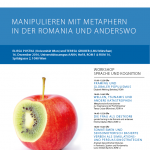
14. Dezember 2016
von LS
Kommentare deaktiviert für Manipulieren mit Metaphern in der Romania und Anderswo
30. November 2016
von LS
Kommentare deaktiviert für Metaphors and political discourse (MetaPol 2016)
Ich bin vom 1. bis 2. Dezember mit Michel Favre auf der internationalen Konferenz „Metaphors and political discourse“ (MetaPol 2016) an der Universität von Liège, Belgien.
Unsere Vorträge:
Weitere Informationen zur Konferenz: https://metapol2016.sciencesconf.org/

19. November 2016
von LS
Kommentare deaktiviert für L’influence du concept de source – une analyse contrastive des extensions et des restrictions sémantiques du verbe «monter»
J’ai le plaisir de vous annoncer la parution de mon article:
Stroebel, Liane (2016). L’influence du concept de source – une analyse contrastive des extensions et des restrictions sémantiques du verbe «monter». Antonio Pamies, Philippe Monneret & Salah Mejri (Éds.): Analogie, Figement et Polysémie. Language Design (Special Issue), pp. 343-370.
Résumé: Une analyse de plus de 2000 verbes de la banque de données de Dubois & Dubois-Charlier (1997) a révélé que la polysémie synchronique se fonde sur les articulations de la conceptualisation des grands ordres cognitifs avec pour centre l’être humain, son environnement et les instruments qu’il utilise. Étant donné que la complexité de ce modèle et de la hiérarchie des concepts de source ne peut pas être illustrée dans sa totalité au cours de cet article, nous esquisserons les relations complexes entre un concept de source précis et les interprétations qui en résultent en nous concentrant sur le verbe français monter.
Mots-clés: polysémie, métaphore, sémantique cognitive
16. November 2016
von LS
Kommentare deaktiviert für International Conference on Language & Emotion (Madrid)
Nächste Woche besuche ich u.a. einen Eye-Tracking- und EEG-Workshop in Spanien und bin mit dem Vortrag:
‘Emotions: Effective persuasive devices in political discourse (France, Spain, and the U.S.)’
auf der Internationalen Konferenz „Sprache & Emotion“ in Madrid.
Alle Masterseminare und Kolloquien finden statt! Nur die Vorlesung und die Sprechstunde muss leider entfallen!
9. November 2016
von LS
Kommentare deaktiviert für How the frequent use of sensory motor concepts in political discourse might have had an impact on the United States presidential election
Introducción/ Introduction (Liane Ströbel)
Primera parte
Este volumen es el resultado de un proyecto sobre temas verbales realizado en el Departamento de Lingüística Románica de la Universidad Técnica de Aquisgrán, inspirado en las experiencias obtenidas en los cursos de lingüística y de práctica del idioma. El libro pretende ser un instrumento útil para el no iniciado ofreciendo un acercamiento didáctico a los grandes temas de la gramática española y francesa. Intenta dar explicaciones de fenómenos sincrónicos que permitan ampliar y profundizar los conocimientos sobre los diferentes temas lingüísticos tratados. No es objetivo de este compendio mostrar los diversos tópicos tratados a través del acopio de datos y referencias bibliográficas, sino presentarlos en forma comprensible con el intento de familiarizar a los estudiantes con las estructuras gramaticales en cuestión. Por eso, hemos optado por mantener en la exposición y la dicción de esta edición el carácter propio de las diferentes contribuciones para así subrayar el potencial de los diferentes enfoques. Además, esta obra no intenta ser completa, sino plural y adaptada a los intereses de los estudiantes y quizás también de los docentes de las dos lenguas románicas tratadas.
Los trabajos se reparten en cuatro capítulos en español y cuatro capítulos en francés. En la primera parte, en español, a través de un enfoque diverso, se explican procesos gramaticales que a primera vista podrían parecer extremadamente simples o incluso ya conocidos, pero que desvelan una gran complejidad teórica y descriptiva que pide una exposición didáctica diferente; de allí que cada capítulo contenga un apartado dedicado a la ilustración, la ejemplificación y la aplicación de los principales pilares de la lengua española.
Vicente Ballero Flores presenta en su contribución „Gráfica intuitiva en el paradigma verbal español“ una vista global sobre el sistema temporal y modal castellano reemplazando la explicación metalingüística por el uso sistemático de elementos gráficos. Su enfoque se basa en dos presupuestos teóricos: la intuición y el „priming“. El primer concepto nace de una lectura inconsciente de los indicios acumulados por la experiencia; el otro, el „priming“ puede ser de nido como la chispa que inicia un proceso de significación. Ambos ayudan a visualizar la concepción y estructura interna de la gramática española y a evitar potenciales interferencias entre el español y otras lenguas.
El artículo de Helene Rader „Las perífrasis verbales a través de los tiempos – formación, historia y delimitación explicadas para hablantes maternos del alemán“ trata un tema esencial en la investigación de la enseñanza de ELE (Español Lengua Extranjera). La autora busca, en su contribución al tema, ilustrar desde un enfoque didáctico el contraste morfosintáctico de las mencionadas construcciones analíticas del español con sus correspondientes traducciones alemanas. En el artículo se realiza un análisis diacrónico sobre el fenómeno de la evolución de los tiempos compuestos desde el latín. Además, se ilustran tanto la formación como el uso de las perífrasis verbales.
Maite Maiztegi Arenaza en su artículo „No es lo mismo ponerse malo que volverse malo – la expresión del cambio en español“ presenta un enfoque similar realzando, eso sí, la diferencia semántica entre verbos que los hispanohablantes acostumbran a elegir según el cambio a expresar (instantáneo, permanente, gradual, de estado o situación, radical, etc.). Debido a los grandes problemas que tal elección supone para aquellos estudiantes de ELE cuya lengua materna solamente dispone de un verbo para expresar cambio („werden“ en alemán, “to become” en inglés, “devenir” en francés, “diventare” en italiano, etc.) la autora se centra en los posibles aspectos combinatorios representando los cambios implicados mediante ilustraciones de orientación cognitiva.
Manuel Rivas González en su artículo „Indefinido e imperfecto para alemanes que estudian Hispánicas“ describe el trasfondo de problemas que esconde la elección entre estos dos tiempos del indicativo en la lengua española. El autor intenta facilitar la comprensión de algunos matices a través de ilustraciones y tablas re exionando igualmente sobre la simetría/no-simetría entre los tiempos simples y compuestos del sistema verbal español.
Deuxième partie
Ce volume est le résultat d’un projet sur les thèmes à propos des verbes, réalisé à l’institut de linguistique romane de l’Université technique d’Aix-la-Chapelle.
L’ouvrage est inspiré d’ expériences réalisées lors de cours de linguistique et de pratique de la langue. Le but de ce volume est de présenter la grammaire sous une forme accessible et de familiariser les lecteurs avec une approche des structures grammaticales en question. Le livre est un instrument utile pour les étudiants, il leur offre une approche didactique des grands thèmes de la grammaire française et espagnole. En outre, il permet d’accroitre et d’approfondir les connaissances déjà acquises en fournissant des explications de phénomènes synchroniques déterminés. A noter que ce tour d’horizon ne prétend pas être complet, mais plutôt pluraliste et adapté aux intérêts des étudiants et des professeurs de langues romanes. C’est la raison pour laquelle nous avons décidé de maintenir le caractère individuel de chaque proposition et d’ainsi souligner le potentiel didactique des différentes perspectives.
L’ouvrage se compose de quatre chapitres en français et de quatre chapitres en espagnol. La partie en français est consacrée au potentiel fonctionnel du verbe. Souvent considéré comme élément pivot dans le processus de composition sémantique, imposant certaines contraintes au reste de l’énoncé, le verbe -dans ses emplois divers et ses fonctions nombreuses (grammaticale, stylistique et pragmatique) – présente un intérêt particulier pour le linguiste.
La première contribution, de Michel Favre, intitulée « Le passé simple, le passé composé et l’imparfait en français », met l’accent sur les points communs et les différences entre ces trois temps verbaux. Après une définition des notions d’aspect, de contexte et de cotexte, suivie d’une présentation des usages les plus courants (la progressivité pour le passé simple [PS], l’aspect d’accompli du passé composé [PC], la description et l’habitude dans le cas de l’imparfait [IMF]), l’auteur attire l’attention sur les emplois non standards : les notions d’arrière-plan ou même itératives du PS, la connexion du PC, grâce à sa nature analytique, avec la situation discursive et une interprétation du sens forain, de l’atténuation et de la modalité pour l’IMF.
Dans sa deuxième contribution « Le passé simple et la notion de vérité générale », Michel Favre met en relief le fait que même si le passé simple est connu pour exprimer une action ou un état en rupture avec le moment de l’énonciation, il possède également la capacité de prolonger cette même action ou ce même état au-delà du présent avec l’aide d’adverbes, tels que toujours, jamais, ou souvent. De plus, par son ancrage dans le passé, il va contribuer à exprimer avec d’autant plus de profondeur et d’intensité une idée qui peut également se véri er dans le présent et aussi dans le futur. Ainsi vole-t-il la vedette au présent ou du moins a-t-il la possibilité de rivaliser avec lui sur un plan sémantique, là où il ne serait pas forcément attendu
Hervé Sanson explore dans sa contribution intitulée « Valeurs du participe présent dans l’œuvre d’Assia Djebar » les modalités d’emploi du participe présent dans deux œuvres de l’écrivaine algérienne d’expression française Assia Djebar: Femmes d’Alger dans leur appartement (1980) et L’Amour, la fantasia (1985). En accentuant, par la position réfléchie des participes, leur caractère épiphanique et le geste d’assomption qu’ils expriment, Djebar met l’accent sur la fonction stylistique du participe présent qui s’ajoute à ses trois emplois essentiels: l’atemporalité, l’apersonnalité et la dynamicité (illustrées par Soga (1975) dans « Les valeurs expressives du participe présent » et Arnavielle (2003) dans « Le participe, les formes en –ant : positions et propositions »).
Alexandra Pereira Martins, quant à elle, tente d’analyser dans son article « L’emploi des verbes performatifs – L’exemple de « J’aime » dans les réseaux sociaux » le potentiel pragmatique des verbes à travers une étude sur le contexte communicatif et l’(inter)action sur Facebook basée sur la théorie des actes de langage. À l’aide de déclarations comme « Like us on Facebook » et « J’aime », elle montre la dimension linguistique de la performativité verbale dans le cadre de ce réseau social.
The question as to how the mind creates “mental images” of concepts and memories, and how we use them in communication and thought, has fascinated philosophers for centuries. While it seems obvious that we acquire the meaning of objects, actions, words and abstract entities through our senses by interacting with our environment, the question as to how our bodies and environment shape the representation of meaning in mind and brain is still highly controversial in cognitive science. The last two decades have seen a number of exciting developments in this area. The concept of “embodiment”, i. e. the idea that sensory-motor systems can be part of abstract higher-level processes and representations, has penetrated a wide range of scientific fields. As demonstrated in these conference proceedings, the topic is discussed in literature studies, theoretical and computational linguistics, psycholinguistics, and cognitive neuroscience. From Chinese characters to metaphors and Shakespeare – the involvement of sensory-motor representations is part of the debate.
The analysis of everyday usage of language, the measurement of reaction times in laboratory tasks, or imaging the brain activity during language comprehension have provided us with a wealth of data on the role of sensory-motor knowledge in language. However, the excitement over the interdisciplinarity of this research area also comes at a cost: Are we all talking about the same things when we talk about embodiment or the role of sensory-motor systems? While for some researchers embodiment manifests itself in the different usage of verbs in metaphors, others require changes in brain activity in specific parts of the cortex. The conference “Sensory Motor Concepts in Language and Cognition” in Düsseldorf provided an ideal forum to discuss issues like these, and brought together world-leading experts from several relevant disciplines.
It became apparent that the abstract concept of embodiment is itself embodied in different ways in language corpora, reaction times and brain activation. We may not all ask the same questions. But connecting different theoretical approaches will help us to ask better questions, and introducing each other to different methodological approaches will help us answering them. Let us hope that our research will be embodied in more conferences like this in the future.
Olaf Hauk (Neuroscience Cambridge)
24. Oktober 2016
von LS
Kommentare deaktiviert für 10th International Conference of the Spanish Cognitive Linguistics Association Discourse, Culture and Contexts
Diese Woche bin ich mit einem Vortrag auf der 10. Internationalen Konferenz der spanischen Gesellschaft für Kognitive Linguistik in Alcalá de Henares (Madrid).
Aus diesem Grund muss die Sprechstunde und die VL leider entfallen, die Masterseminare und die Master-& Doktorandenkolloquien finden wie gewohnt statt!
13. Oktober 2016
von LS
Kommentare deaktiviert für LingUnite
Die Romanische Sprachwissenschaft ist auf der LingUnite mit 9(!) Postern vertreten:
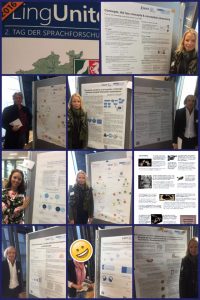
Hier finden sich weitere Informationen: 2016-tagungsband-book-of-abstracts-als-pdf
10. Oktober 2016
von LS
Kommentare deaktiviert für Wahlkampf ist Wortkampf: Präsidentschaftswahlkampagnen aus sprachwissenschaftlicher Sicht
Diese Woche bin ich mit Herrn Favre auf der Tagung „Wahlkampf ist Wortkampf: Präsidentschaftswahlkampagnen aus sprachwissenschaftlicher Sicht“
in Kassel mit den folgenden Vorträgen:
„Wiedererkennung- und Identifikationsstrategien im Wahlkampf“ (Michel Favre)
„Die Rolle von Somatismen & sensomotorisch basierten Verben als Simulations- und Imitationsstrategie im politischen Wahlkampf“ (Liane Ströbel)
Hier ist das vollständige Programm:
wahlkampf-ist-wortkampf_kassel_okt_2016
Bitte schon vormerken:
Am Freitag (14.10.) wird die Romanische Sprachwissenschaft mit 9 (!) Postern auf der LingUnite in Aachen vertreten sein!
Weitere Informationen folgen!
4. Oktober 2016
von LS
Kommentare deaktiviert für DGKL 7, Essen-Duisburg: „Cognitive approaches to interaction and language attitudes“
Vom 4.10.16-7.10.16 bin ich mit zwei Vorträgen auf der internationalen Konferenz DGKL 7, Essen-Duisburg: „Cognitive approaches to interaction and language attitudes“
5.10.16 „How flexible are concepts?“
6.10.16 „Kognitive Betrachtung usueller Wortverbindungen im Deutschen vs. Spanischen“ (zusammen mit Ana Mansilla, Universidad de Murcia, Spanien)

4. August 2016
von LS
Kommentare deaktiviert für The Iberian Challenge: Creole Languages Beyond the Plantation Setting
Armin Schwegler, John McWhorter, Liane Ströbel (eds.).
Creole languages lexified by Spanish and Portuguese have played a relatively small role in theories of creole genesis, and as a result the histories of vernaculars such as Palenquero, Papiamentu, Cape Verdean Creole, and the Gulf of Guinea creoles (e.g., São Tomense or Annobonese) have typically been considered distinct evolutionary events. In contrast, English and French-based creoles (e.g., Hawaiian Pidgin English or Haitian French), formerly spoken on large-scale plantations, have always been viewed as the “default” or prototypical kind.
This volume takes issue with this traditional view by arguing that there is no a priori reason to give plantation creoles this preferential treatment. As the ten articles assembled here show, the plantation scenario is only one of many — a realization that poses special challenges to theories of creole genesis that seek to be maximally comprehensive. Overall, Iberian-based creoles thus demonstrate a diversity of complex circumstances that any overarching theory of creole genesis ought to take into account.
17. Juli 2016
von LS
Kommentare deaktiviert für Ad hoc concepts or conceptual parameters in the course of time?
From the 18th until the 23rd of July I will attend the 6th UK Cognitive Linguistics Conference in Bangor.
In my talk „Ad hoc concepts or conceptual parameters in the course of time?“ I will try to solve a putative contradiction: the stability of concepts and their presupposed flexibility in usage (see Casasanto & Lupyan 2015). I will show that stability is not an illusion but rather a definitory problem. Concepts in themselves are global, yet while transferring these mental images into language, originally stable concepts – due to the linearity of language – need to be broken down into describable entities. A synchronic and diachronic analysis of more than 800 words from various Romance Languages revealed that it is exactly the breaking down of a concept into individual (at the same time universal) slices that allows for the diachronic flexibility of the concept, given the fact that whenever the concept is linguistically activated, the speaker has a choice of anchoring points (i.e., parameters). The latter may vary over time. In the beginning, prototypical parameters of the concept are favored, but with time the salience of these entities (due to frequency patterns and loss of expressivity) can alter. In sum total, the gap between the assumed stability of concepts on the one hand, and their flexibility in usage on the other, can be bridged by presuming that our knowledge is not organized in stable concepts but rather in flexible parameters which, in mutual interrelation, define and prime said concepts (see Barsalou, Wilson, and Havenkamp 2010; Spivey 2007). In order to illustrate this idea, my talk will focus on the semantic mappings between the conceptual parameters in the course of time, on the existing restrictions in the actual use of these concepts, as well as on the typological differences between related and unrelated languages. In conclusion, I will raise the question whether it is more adequate to speak of an ad hoc focalization on a particular conceptual parameter instead of ad hoc concepts.

4. Juli 2016
von LS
Kommentare deaktiviert für Geschützt: Vortrag von Zoltán Kövecses im Masterkolloquium „Literature, Language and Emotion“
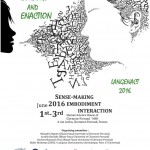
1. Juni 2016
von LS
Kommentare deaktiviert für À la recherche de l’architecture des concepts en général et des concepts ad hoc en particulier
D’un point de vue linguistique, le terme de concept est dérivé du latin concipere qui signifie ‘prendre entièrement’. En architecture, il signifie construire une représentation de quelque chose qui n’existe pas encore. En combinant ces deux approches distinctes, on en arrive à la conclusion qu’un „concept“ fait référence à une représentation du monde acquis soit par l’expérience soit par l’imagination et qui est fourni par une structure hiérarchique. Néanmoins dans la communication actuelle, il semble qu’on puisse utiliser les concepts plus ou moins librement et sans trop de restrictions. Et, c’est précisément ici qu’apparaît une contradiction potentielle (Casasanto & Lupyan 2015). Comment se fait-il qu’un terme puisse être employé d’une manière si flexible alors que la stabilité de ce même terme est bien ancrée dans sa définition?
Dans ma communication, je montrerai qu’il ne s’agit pas d’une contradiction réelle, mais plutôt d’un problème de définition. Basé sur l’hypothèse que les domaines de source conceptuels sont fortement liés aux trois grandes catégories (self-regulation, sensorimotor coupling, intersubjective interaction) de Thompson & Varela (2001) et inspirés du lien étroit entre perception et action (Noë 2004), j’expliquerai que les concepts eux-mêmes sont globaux, mais en transférant ces images mentales dans le langage, leur stabilité doit céder – face à la linéarité de la langue – à la nécessité de diviser cette unité en éléments particuliers.
Une analyse synchronique et diachronique de plus de 800 mots de différentes langues romanes montrera que c’est particulièrement cette division d’un concept en des entités individuelles et en même temps universelles qui est responsable de la flexibilité synchronique du concept. Etant donné que chaque fois que le concept est activé, le locuteur a un choix des points d’ancrage, même si ces derniers (ou plutôt les diverses interprétations possibles, Varela, Thompson & Roch 1991) peuvent varier à travers le temps. Au début, on constate une préférence pour des paramètres prototypiques d’un concept, mais avec le temps, la caractéristique marquante de ces entités (en raison de changements de fréquence et du niveau de l’expressivité) peut changer. Le clivage entre la stabilité assumée et la flexibilité qui règne dans l’usage actuel peut être compensé en partant du principe que notre savoir n’est pas organisé en concepts stables mais plutôt en paramètres flexibles, qui en interaction mutuelle, définissent l’idée du concept et priment sur elle (Barsalou, Wilson, and Havenkamp 2010; Spivey 2007). Pour illustrer cette idée, la communication sera centrée sur le corps comme « point zéro d’orientation » (Husserl 1989), sur les mappings sémantiques entre les paramètres conceptuels à travers le temps, sur les restrictions existantes dans l’usage actuel et sur les différences typologiques entre des langues romanes et non-romanes. En conclusion, ma contribution posera la question de savoir s’il ne serait pas plus adéquat de parler d’une focalisation ad hoc d’un certain paramètre conceptuel que de concepts ad hoc.
References
Allott, N., and M. Textor. 2012. Lexical pragmatic adjustment and the nature of ad hoc concepts. International Review of Pragmatics 4 (2): 185–208.
Barsalou, L. W. 1983. Ad hoc categories. Memory & Cognition 11:211–227.
Barsalou, L. W., C. D. Wilson, and W. Hasenkamp. 2010. On the vices of nominalization and the virtues of contextualizing. In: The Mind in Context, ed. B. Mesquita, L. Feldman-Barrett, and E. Smith, 334–360. New York: Guilford Press.
Boroditsky, L., and M. Ramscar. 2002. The roles of body and mind in abstract thought. Psychological Science 13 (2): 185–188.
Casasanto, D. 2014. Bodily relativity. In: Routledge Handbook of Embodied Cognition, ed. L. Shapiro, 108–117. New York: Routledge.
Casasanto, D., and G. Lupyan. 2015. All concepts are Ad Hoc Concepts. In the Conceptual Mind: New directions in the study of concepts. E. Margolis & S. Laurence (Eds.), pp. 543-566, Cambridge, MIT Press.
Elman, J. L. 2004. An alternative view of the mental lexicon. Trends in Cognitive Sciences 8 (7): 301–306.
Evans, V. 2009. How Words Mean. Oxford: Oxford University Press.
Gallagher, S. 1986. Body image and body schema: a conceptual clarification. The Journal of Mind and Behavior 7: 541-554.
Husserl, E. 1989. Ideas Pertaining to a Pure Phenomenological Philosophy and to a Phenomenological Philosophy, Second Book. Trans. R. Rojcewicz and A. Schuwer. Dordrecht: Kluwer Academic Publishers.
Legrand, D. 2005. The bodily self: the sensori-motor roots of pre-reflexive selfconsciousness. Phenomenology and the Cognitive Sciences.
Lupyan, G. 2012. What do words do? Towards a theory of language-augmented thought. In: The Psychology of Learning and Motivation, vol. 57, ed. B. H. Ross, 255–297. London: Academic Press.
Lupyan, G., and S. L. Thompson-Schill. 2012. The evocative power of words: Activation of concepts by verbal and nonverbal means. Journal of Experimental Psychology: General 141 (1): 170–186.
Noë, A. 2004. Action in Perception. Cambridge, MA: The MIT Press.
Papafragou, A., J. Hulbert, and J. Trueswell. 2008. Does language guide event perception? Cognition 108 (1): 155–184.
Snedeker, J., and L. Gleitman. 2004. Why is it hard to label our concepts? In: Weaving a Lexicon, ed. D. G. Hall and S. R. Waxman, 257–294. Cambridge, MA: MIT Press.
Spivey, M. 2007. The Continuity of Mind. New York: Oxford University Press.
Taylor, L. J., and R. A. Zwaan. 2009. Action in cognition: The case of language. Language and Cognition 1:45–58.
Thompson, E. and Varela, F.J. 2001. Radical embodiment: neural dynamics and consciousness. Trends in Cognitive Sciences 5: 418-425.
Varela, F.J., Thompson, E. and Rosch, E. 1991. The Embodied Mind: Cognitive Science and Human Experience. Cambridge, MA: The MIT Press.
Weiskopf, D. 2009. The plurality of concepts. Synthese 169:145–173.
Zwaan, R. A. 2004. The immersed experiencer: Toward an embodied theory of language comprehension. In: The Psychology of Learning and Motivation, vol. 44, ed. B. H. Ross, 35–62. New York: Academic Press.
4. Februar 2016
von LS
Kommentare deaktiviert für Geschützt: Decisive/Divisive: The Political Rhetoric of 2015 and Beyond
Liebe Teilnehmer der Sektion „Phänomene der Verknappung in den romanischen Sprachen, Literaturen und Kulturen“ des Romanistentags 2015 in Mannheim „Romanistik und Ökonomie: Struktur, Kultur, Literatur“ (Programm)
vielen Dank für die interessanten Diskussionen und Anregungen.
Wie versprochen finden Sie die Fotos entweder hier oder hier.
Die Fotos werden per Klick größer und können auch heruntergeladen werden!
Das Passwort wird per Email zugesandt!
Herzliche Grüße,
Sieglinde Borvitz, Liane Ströbel, Yasmin Temelli
Meiner neuer Artikel
ist erschienen:
Ströbel, L. (2015). Linguistic Realizations of the Concept of FEAR (p. 219-236), in: Gamerschlag, T., Gerland, D., Osswald, R., and W. Petersen. Meaning, Frames, and Conceptual Representation. Studies in Language and Cognition 2, d|u|p: Düsseldorf.
Abstract:
There is something about fear…
This paper is an attempt to look into patterns of use and variation concerning the conceptualization of ‘fear.’ Analyzing the semantic field and syntactic structure of fear expressions in French, the following questions will be tackled: Which of the parameters associated with fear play a role in the linguistic encoding? Are there conceptual differences between the different realizations of this complex concept? Is it possible that ‘fear’ only has one central core or source? And finally, can members of the semantic field of fear function as a conceptual source themselves?
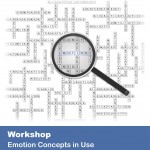
17. Juni 2015
von LS
Kommentare deaktiviert für How to describe the indescribable: Charlie Hebdo & Germanwings
Vortrag: How to describe the indescribable: Charlie Hebdo & Germanwings (Liane Ströbel)
What does it take to describe an emotion? And how can an experience, such as shock, be described? Shock is not really classified as an emotion, due to the fact that it does not display exclusive features, but rather shares its dominant parameters with more prominent emotions, such as e.g. fear. Therefore, it is mostly considered either as something in a grey area, classified as the initial phase of other emotions, or limited to the negative counterpart of surprise.
A contrastive analysis of the linguistic realizations of emotional parameters associated with the experience of shock as well as a corpus analysis of political discourse with regard to recent tragedies, such as Charlie Hebdo and the Germanwings’ accident, and their aftermaths dealing with overcoming this state of shock, will illustrate the linguistic and non-linguistic complexity of this particular, “bounded” emotion.
Workshop: Emotion Concepts in Use (Official Website)
Workshop time and location: June 25 – 26 , 2015, Heinrich-Heine-University Düsseldorf, Germany, O.A.S.E.
HHU_Broschüre_Emotion Concepts in Use
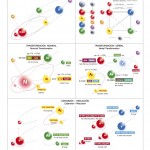
10. Mai 2015
von LS
Keine Kommentare
Folgendes Gemeinschaftsprojekt mit Vicente Ballero Flores wird im Mai auf der Konferenz der französischen kognitiven Gesellschaft in Grenoble vorgestellt:
Computer animated models of visualizing reanalyzing processes
(Vicente Ballero Flores, Liane Ströbel)
The project focuses on the mental representations of grammar. Given the fact that the dynamic processes inherent to grammatical reanalysis cannot be made visible in FMRI, at least at this technical stage, we have chosen to illustrate the transformation processes which take place on the syntactic level, by starting out with a static representation of the main players and developing from there a dynamic computer animated model in order to display different reanalyzing processes on the syntactic level, such as relation, transformation and substitution. The following graphic represents the main word classes, such as nouns (N), verbs (V), adjectives (Aj), adverbs (Av), articles (ar), prepositions (pp), pronouns (pn) and subordinate conjunctions (sk):
G1: Main word classes
The hierarchical relation between the planets (N, V, Aj and Av), their moons (ar in the case of N, pn in the case of N) and their satellites (pp in the case of N and sk in the case of V) are illustrated in graphic 2:
G2: Denominal moon and denominal satellite
The different existing dynamic processes in between the entities are marked with different lines and fleshes such as ”—” (relation), ”–> ” (substitution) and a solid flesh for transfor- mation processes, such as in graphic 3:
Graphic 3 illustrates that the conglomeration of a preposition (pp) and a noun (N) can lead to at least two new interpretations of the underlying functional structure (deep structure). In a sentence such as Pierre est sûr de l’amour de Marie the construction ”de Marie” (surface structure: pp N) can be regarded from a functional point of view as an adjective (Aj) and in a sentences such as Marie fait ses études à Paris, ”à Paris” or in other words the same surface structure (pp N) fulfills the function of an adverb of location (Av).
The aim of this project is to present a computer animated dynamic model which allows not only to group the results of different reanalyzing processes, but also to set up ways to visualize the functional distances between near synonymical constructions in one language. Furthermore, from a cognitive perspective, it will be highlighted that different surface structure patterns in French, Spanish, English and German, are based on similar deep structure phenomena. The results of this visualization model of grammatical reanalyzing processes can have an important impact on the way sentences will be structured and chosen in future FMRI experiments as the transformation tool shows that the surface structure only reflects inadequately the hierarchical structures and functions of the cognitive deep structure (e.g an adjective doesn’t have to be in adjectival function in a construction and the assumption of ”word class = function” may lead to incorrect interpretations in neurological experiments).

10. Mai 2015
von LS
Keine Kommentare
Folgendes Forschungsprojekt wird im Mai auf der Konferenz der französischen kognitiven Gesellschaft in Grenoble vorgestellt:
Analyse contrastive des mécanismes sémantiques entre le concept de source et ses domaines cibles potentiels
(Liane Ströbel)
L’objectif principal de cette approche sémantico-cognitive est de montrer l’influence prédominante du concept de source (approche diachronique) dans les emplois synchroniques d’un verbe. Souvent considéré comme élément pivot dans le processus de composition sémantique, imposant certaines contraintes au reste de l’énoncé, le verbe présente un intérêt particulier pour le linguiste. L’analyse de la polysémie verbale implique l’élaboration d’une hiérarchie des concepts de source (Lakoff, 1987 : 267) et d’une cartographie des schèmes sémantico-cognitifs associés (François, 2007, 2010; Desclés & Guentcheva, 2005; Haspelmath 2003; van der Auwera 2008). Une telle analyse suivra donc un double objectif: d’une part, sur le plan linguistique, celui d’illustrer les différentes interprétations de destination (domaine cible) d’un seul concept de source, et d’autre part, sur le plan cognitif, celui de mieux faire comprendre les mécanismes et paramètres de la relation entre le concept de source et les interprétations qui en d’écoulent.
L’analyse de plus de 2000 verbes de la banque de données de Dubois & Dubois-Charlier (1997) a révélé que la plupart des verbes ne se basent que sur trois catégories prédominantes de concepts de source, à savoir “ Embodiment ”, “ Environnement ” et “Dimensions”. En d’autres termes, la polysémie synchronique se fonde sur les articulations de la conceptualisation des grands ordres cognitifs (similaire aux “ image schemas ”, Langacker, 2008 ; Gibbs, 2005) avec pour centre l’être humain, son environnement avec les instruments qu’il utilise et des dimension pour décrire ces derniers. Ces trois domaines capitaux contiennent de multiples sous-catégories individuelles et communes qui sont composées des expériences et des associations liées à ces entités (p.ex. [location], [contact], [orientation], [direction], [forme], [extension], [point final], [vitesse], [manière], etc.).
Étant donné que la complexité de ce modèle ou de la hiérarchie des concepts de source ne peut pas être illustrée dans sa totalité, nous esquisserons au moins les relations complexes entre un concept de source précis et les interprétations qui en résultent (domaine cible) en nous concentrant sur les verbes, indiquant un changement de valeur (interprétation intensionelle; Aurnague, 2008; Emirkanian, 2008 et Yune, 2009).
Notre approche diachronique, qui souligne l’influence du concept de source dans les emplois synchroniques d’un verbe, a) aboutit à l’établissement d’une carte d’identité de ces verbes qui nous donne un aperçu de la complexité du modèle des concepts de source, et b) nous aide à expliquer les différences dans l’emploi d’un verbe et de ses équivalents dans d’autres langues.
Pour conclure, l’avantage de l’intégration du concept de source (approche diachronique) à l’analyse d’un verbe réside dans l’association du verbe à une image qui permet une meilleure conceptualisation de la structure de ce verbe et de ses différents emplois et restrictions sur l’axe synchronique.
Keywords: mécanismes sémantiques, concept de source, domaines cibles

8. April 2015
von LS
Kommentare deaktiviert für Emotion Concepts in Use – An interdisciplinary workshop at Heinrich-Heine-University Dusseldorf (June 25-26, 2015)
Call for Papers
This workshop aims at analyzing emotion concepts from an interdisciplinary perspective (linguistics, philosophy, psychology). On the one hand, the workshop is interested in the cognitive mechanisms underlying the experience of emotions and emotion concepts, and, on the other hand, it is interested in the (frame-theoretical) modeling and prediction of the ways in which emotion expressions are used.
A core feature of human mental life is not only the experience of emotion but also the application of emotion concepts to the outer world. We do not only know what it is like to be surprised, but we also describe a situation or an event as surprising or even call something a surprise. On the contrary, we might consider a situation to be sad, but we would not label it by the word ’sadness‘ (in English, at least).
Moreover, it is not only the case that we apply emotion concepts such as SAD and JOYFUL to inanimate subjects as music, art and literature (e.g., this song is so sad, this melody is so joyful, this story has a happy ending), but we also use emotion concepts to intensify our emotions when we speak, for example, about panic-stricken fear.
Our invited speakers are:
In addition, we invite abstracts of no more than 250 words to be submitted to smelkonian@phil.uni-duesseldorf.de for blind refereeing until May 2.
Successful applicants will be informed by May 15.
Abstracts should deal with the following (or related) topics:
Organization
Heinrich-Heine-University Dusseldorf, CRC 991: The Structure of Representations in Language, Cognition and Science, sponsored by the German Research Foundation (DFG)
Please note: Due to internal infrastructural complications and five fairs to be held in Dusseldorf in the week of June 18 and 19, we had to reschedule our workshop. The new dates for the workshop are June 25 and 26.
Directors
Susanna Melkonian (smelkonian@phil.uni-duesseldorf.de)
Liane Stroebel (stroebel@phil.uni-duesseldorf.de)

5. Januar 2015
von LS
Keine Kommentare
Im Rahmen des DFG-Sonderforschungsbereich 991: „Die Struktur von Repräsentationen in Sprache, Kognition und Wissenschaft“ findet am 22.01.2015, von 12:30-14:00 Uhr, in Raum 23.21/HS 3H der HHU, Chair: Liane Ströbel, der Vortrag von Antonio Barcelona Sánchez (Córdoba) statt.
Abstract:
30. Dezember 2014
von LS
Keine Kommentare
Im Rahmen des DFG-Sonderforschungsbereich 991: „Die Struktur von Repräsentationen in Sprache, Kognition und Wissenschaft“ findet am 15.01.2015, von 12:30-14:00 Uhr, in Raum 23.21/HS 3H der HHU, Chair: Liane Ströbel, der Vortrag von Francisco J. Ruiz-de-Mendoza statt.
Abstract:
Francisco J. Ruiz-de-Mendoza: On the ubiquity of cognitive processes in coding and inferring meaning
The starting point for this presentation is the understanding of meaning construction as a trade-off between meaning as coded on the basis of lexico-constructional mechanisms and meaning as inferred on the basis of linguistic and extralinguistic cues. Both kinds of meaning-making activity yield internally consistent meaning representations or „meaning structure“ of four broad types: predicate-argument structure, implicational structure, illocutionary structure, and discourse structure. Furthermore, both coded and inferred meaning arise from the same set of underlying cognitive process. Thus, for each of these representational types we postulate an underlying cognitive model type. Predicate-argument representations are based on the cognitive exploitation of high-level non-situational cognitive models (e.g. the ‚action‘ frame, whose subdomains include the roles of actor, object, instrument, result, etc., is central to constructions in the area of transitivity). Implicational structure is the result of exploiting low-level situational cognitive models; for example, ‚getting a tooth fixed by the dentist‘ can be activated by mentioning a relevant part of the ‚going to the dentist‘ situational model (A: Did your tooth stop hurting? B: Yes, I finally called the dentist). Illocutionary structure arises from the metonymic activation of high-level situational cognitive models (e.g. stating a need can be taken as a request on the grounds of a social convention whereby we have to act in ways that are beneficial to others provided that we have the capacity and it is reasonable for us to do so). Finally, discourse structure pairs two or more high-level non-situational cognitive models logically (e.g. cause-effect, evidence-conclusion, etc.), temporally (e.g. precedence, simultaneity, etc.), or conceptually (e.g. similarity, contrast, etc.). On the basis of these initial assumptions, we proceed to examine a wide range of meaning-making linguistic phenomena and account for their motivation in other cognitive processes. For example, we find ‚upscaling‘ and ‚downscaling‘ gradable cognitive models not only in overstatement and understatement (as should be expected) but also in some lexical and grammatical phenomena involving strengthening and mitigation. Or we find echoing not only in reported speech or in irony (as postulated by relevance pragmatics theorists) but in constructions coding implicated and illocutionary meaning (e.g. Don’t you X, as in „Don’t you daddy me“, where „daddy“ echoes the speaker’s attempt to appease her interlocutor) and in some discourse relations (e.g. paraphrase, restatements, etc). The presentation concludes with a listing of cognitive processes and the areas of meaning representation where each of them plays a role, whether in the domain of coded or inferred meaning, plus an examination of the principles that constrain such processes. Since the evidence points in the direction of a limited set of processes being ubiquitous in meaning construction, the resulting account is endowed with a higher degree of generalization than explanations that do not take into account meaning regularities based on the principles of cognitive modeling.
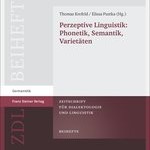
10. November 2014
von LS
Keine Kommentare
Derrick de Kerckhove
Auszug: „Wie kommt ein Franzose, der auf einen Baum geklettert ist, wieder herunter?“ Diese von Geuder (2009) in seinem Aufsatz „Descendre en grimpant“ aufgeworfene Frage veranschaulicht schön den Konflikt, welcher auf dem kontrastiven Unterschied basiert, dass sich das deutsche Verb klettern flexibel mit verschiedenen Richtungsangaben kombinieren lässt, das französische Verb grimper hingegen sich aber nur für Aufwärts- (und unter Umständen auch Seitwärts-) aber nicht für Abwärtsbewegungen verwenden lässt. Bevor weitere -aus kontrastiver Sicht- problematische Szenarien betrachtet werden, werden kurz einige Faktoren vorgestellt, die bei der kognitiven Strukturierung der Wahrnehmung einer Handlung (wie z.B. der Beobachtung des „Kletterns auf einem Baum“), eine entscheidende Rolle spielen. Als Ausgangspunkt dient die Feststellung, dass wir unsere Umgebung als Ganzes, bestehend aus hierarchisch geordneten Komponenten, wahrnehmen. Fast immer unterscheiden wir zwischen einer meist kleineren und beweglicheren im Fokus stehenden Variablen bzw. der Figur, und einer weiteren meist größeren und eher statischeren Bezugsgröße, dem Grund:
The Figure is a moving or conceptually movable entity whose site, path, or orientation is conceived as a variable (…). The Ground is a reference entity, one that has a stationary setting relative to a reference frame, (…).“ (Talmy 2000: 184; vgl. dazu auch Jackendoff/Landau 1991, Landau/Jackendoff 1993, Vandeloise 1987).
Die Beschreibung des Figur-Grund-Verhältnisses ist gerade bei Positionsangaben wichtig, da diese nicht isoliert, sondern immer im räumlichen Kontext existieren. Basierend auf dieser Distinktion werden bei der Analyse die verschiedenen Parameter, wie z.B. Kontakt (ohne direkte Unterstützung des Gewichts), Support (Unterstützung des Gewichts gegen die Gravitation), Ausrichtung (vertikal vs. horizontal), Orientation (oben vs. unten), Konsistenz (Material des Grunds) etc., abgefragt und die jeweils dominanten Parameter bzw. kognitiven Ankerpunkte bei der sprachlichen Kodierung herausgestellt (vgl. Berthele 2004, Kaufmann 1995, Kutscher und Schultze-Berndt 2007, Serra Borneto 1996, etc.). Gerade durch den kontrastiven Vergleich (Deutsch vs. Französisch) wird die Frage aufgeworfen, inwieweit fehlende Parallelen in der sprachlichen Kodierung auch Rückschlüsse über potentielle Unterschiede in der Perzeption bestimmter Positionen im Raum suggerieren, vgl. Kopecka (2004: 19):
« (…) la langue est considérée comme un système de formes dont la fonction est de transmettre des idées, et dont tous les éléments, de la plus petite unité de sens jusqu’aux constructions plus complexes, entretiennent des rapports étroits pour aboutir à une [cette] fin. »
Mit anderen Worten beeinflussen die Grenzen und Spielräume der jeweiligen Einzelsprache nicht nur die sprachliche Kodierung, sondern vielleicht auch allein aufgrund ihrer Existenz die Wahrnehmung, ähnlich einem Filter?, vgl. Slobin (1996) bzw. Kopecka (2004: 38):
(…) lorsqu’ils pensent et planifient pour parler, les locuteurs doivent prendre en compte les spécificités morphosyntaxiques et lexicales de leur langue maternelle pour faire les distinctions nécessaires (…).
Da der Titel „Descendre en grimpant“ von Geuder (2009) bereits eine Lösung für die eingangs gestellte Frage anbietet, nämlich die Verwendung einer Kombination aus einem Bewegungsverbs (mit vertikaler Ausrichtung und Orientierung nach unten) mit einer Art und Weise Angabe, wird es in dem vorliegenden Artikel um weitere Grenzen und Spielräume der sprachlichen Kodierung im Bereich der räumlichen Wahrnehmung gehen, wobei der Fokus vor allem auf den gebräuchlichsten Positionsangaben, wie z.B. LIEGEN, KNIEN, SITZEN, STEHEN und HÄNGEN liegen wird.

29. Oktober 2014
von LS
Keine Kommentare
Ab WS 2014/2015 geht unser Projekt @IXpansion (gefördert durch Blended Learning Mittel der RWTH zur Verbesserung der Lehre) an den Start!
Was ist @IXpansion?
Unsere Zielvorgaben sind dreifacher Natur:
Erstens ist @IXpansion ein seminarübergreifendes, sprachtheoretisches, wie auch sprachpraktisches Gemeinschaftsprojekt mit dem Ziel den Studierenden durch die Vernetzung verschiedener linguistischer Kurse und unterschiedlicher sprachpraktischer Einheiten die Möglichkeit zu geben, wichtige Zusammenhänge der einzelnen Veranstaltungen zu entdecken und spezifische Themengebiete zu vertiefen.
Zweitens ist @IXpansion der erste Baustein einer virtuellen Kurs-Bibliothek, nämlich Rom@ani@ relo@ded, mit eigenständigen Lehreinheiten zum Selbststudium oder gezielten Vorbereitung auf Prüfungen (ähnlich CURSERA, https://www.coursera.org/).
Drittens ist es durch sein umfangreiches Strukturprogramm: @IXtern, @IXklusiv, @IXtralingual, @IXchange, Biblioth@IXmaterial, @IXamen, @IXpert und @IXplore, ein erster Anreiz zum eigenständigen Lernen und Forschen und bietet darüberhinaus mannigfaltige Anknüpfungspunkte und Kooperationsmöglichkeiten mit anderen Forschungsprojekten.
Genaue Angaben zu den beteiligten Kursen & den Lerninhalten in Kürze!
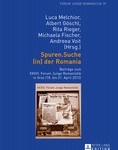
2. Oktober 2014
von LS
Keine Kommentare
Mein Artikel: „Sprache & Gedanken – Mit Sherlock Holmes auf Spurensuche“ ist erschienen in:
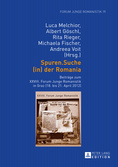
Abstrakt:
La grammaire ainsi que le lexique d’une langue peuvent être considérés comme des œuvres d’art cognitives formées à partir de plusieurs stratégies communicatives. Cette étude aura pour objet d’analyser différents exemples issus de plusieurs langues romanes et non-romanes, afin de démontrer que l’emploi de somatismes est très répandu et très productif. La symbiose entre les compétences cognitives et les processus sensori-moteurs sera illustrée à l’aide de techniques empruntées au domaine de la neurologie et de travaux philosophiques récents. L’analyse vise à montrer que ni les pensées ni la langue ne peuvent pas être étudiées en faisant abstraction du corps humain. Les résultats de l’étude contribueront à une meilleure compréhension de la manière dont la langue est structurée et de la façon dont elle est stockée en mémoire.
Hier eine kurzer Auszug aus der Einleitung:
Wer könnte bei der Spurensuche nach den Ursprüngen der Versprachlichung unserer Gedanken hilfreicher sein als der wohl berühmteste Meisterdetektiv Sherlock Holmes selbst? Nach Sherlock Holmes ist die Welt „full of obvious things“, welche aber oft übersehen werden, wenn man die Spuren nicht richtig deutet. Daher gibt es für ihn keinen wichtigeren Bereich der detektivischen Arbeit als die Spurensuche per se, vgl.: There is no branch of detective science which is so important and so much neglected as the art of tracing footprints. (Auszug aus A Study in Scarlet, zitiert nach Truzzi (1983, 68)). Spuren spielen auch in den folgenden Ausführungen eine große Rolle. Genauer, in diesem Beitrag geht es um das Aufzeigen der kognitiven Prozesse an der Schnittstelle der Übertragung von Gedanken in Sprache. Diese Prozesse lassen sich mit Hilfe der Untersuchung von Lexikalisierungs- und Grammatikalisierungsprodukten aus synchroner und diachroner Sicht gut illustrieren. (…)
Dabei wird versucht, dem Ideal des perfekten Detektivs zu folgen, der – ausgehend von Beispielen aus verschiedenen Sprachen und Sprachfamilien – das Motiv für die hohe Frequenz von Somatismen als Quelldomäne vieler Sprachwandelprozesse nicht nur erhellt, sondern auch sich daraus ergebenen Implikationen in die Analyse mit aufnimmt, vgl.: The ideal reasoned […] would, when he once been shown a single fact in all its bearings, deduce from it not only all the chain of events which led up to it but also all the results which follow from it. (Auszug aus The Five Orange Pips, zitiert nach Truzzi (1983, 60)) Dabei ist für Sherlock Holmes besonders die Einbeziehung der diachronen Achse wichtig, ohne die die Ergebnisse auf der synchronen Ebene nicht entschlüsselt werden können, vgl.: […] the grand thing is to be able to reason backward. That is a very useful accomplishment, and a very easy one, but people do not practice it much. In the everyday affairs of life it is more useful to reason forward, and so the other comes to be neglected. (Auszug aus A Study in Scarlet, zitiert nach Sebeok / Umiker-Sebeok (1988, 39) (…)
2. Oktober 2014
von LS
Keine Kommentare
Nach einer längeren Beschäftigung mit dem Thema „Angst“ („Sprachliche Facetten der Angst“, „Where does my fear lead me…“, etc.), geht es wieder „back to the roots“ und zwar zu einer bereits früher behandelten Emotion bzw. dem Überraschungseffekt („Überraschung, Erstaunen & Verzückung bzw. die Darstellung von Emotionen im Film: La vita è bella““). Aus diesem Grund nehme ich am 10.10 an der Université Paris Diderot am Colloque „Description et expression linguistique de la surprise“ teil.
23. September 2014
von LS
Keine Kommentare
Vom 29.09 -03.10 bin ich auf der
6. Internationalen Konferenz der Deutschen Gesellschaft für Kognitive Linguistik
an der Friedrich-Alexander-Universität Erlangen-Nürnberg
mit dem Vortrag:
„How do we conceive and store actions and which parameters are at play?“
Weitere Informationen
&
das vollständige Programm!
17. September 2014
von LS
Keine Kommentare
Diese Woche bin ich in Granada auf dem Colloque International Langage et Analogie mit dem Vortrag:
L’influence du concept de source. Une analyse contrastive des extensions et des restrictions sémantiques du verbe « monter »

10. September 2014
von LS
Keine Kommentare
Sensomotorische Strategien & Sprachwandel (Liane Ströbel)
Qu’est-ce qu’une idée? C’est une image qui se peint dans mon cerveau.
(Voltaire, Dict. Phil. Fanatisme)
It is not enough to say that the mind is embodied; one must say how. (Edelman, 1992: 15)
Abstrakt: Unter den aktuell in den Neurowissenschaften diskutierten Themen ist eines für die Linguistik von besonderer Bedeutung: die Spiegelung wahrgenommener Umweltreize im Gehirn −durch Spiegelneuronen. Der bekannteste Beleg dafür ist sicherlich die Tatsache, dass Lachen ansteckt. Doch neben der Empathie für die Stimmung des Gegenüber (vgl. Shamay-Tsoory et al. 2009) ist die Spiegelung auch für die Sprache absolut zentral. Denn auch hier gilt: „imagination is mental simulation“ (Gallese/Lakoff 2005). Dazu passt, dass wichtige Bereiche der Emotionserkennung und Sprachproduktion räumlich nebeneinander liegen, beide in Areal BA 44 (vgl. Rizolatti 2008, Shamay-Tsoory et al. 2009). Um beispielsweise die Bedeutung von dt. begreifen zu verstehen, muss man sich den Prozess des Greifens bildlich vorstellen können (vgl. Gallese/Lakoff 2005, Gallese 2003). Zudem aktiviert –ähnlich wie beim ‘ansteckenden Lachen’ –die Wahrnehmung solcher sensomotorischer Prozesse (sowie allein schon ihre Vorstellung) dieselben Hirnareale wie ihre Ausübung (vgl. Rizzolatti et al. 1996, Calvo Merino 2006, Grafton 2009). Diese Erkenntnisse werfen ein ganz neues Licht auf das Verständnis von Sprachwandelprozessen, die Sprachproduktion per se, als auch für das Sprachverständnis.
Sprache entsteht durch Kommunikationswillen und Gedankenstrukturierungsversuche und ist daher auch immer das Ergebnis von Problemlösungsstrategien (Langacker 2008: 540). Der vorliegende kognitive Ansatz versucht, Motivationen hinter verbalem Sprachwandel aufzudecken. Dabei wird der Schwerpunkt auf dem Französischen und Spanischen liegen, aber auch Entwicklungen in nicht-romanischen Sprachen, wie z.B. im Chinesischen und Japanischen, berücksichtigen. Am Beispiel von statischen (z.B. avoir/tener) und dynamischen sensomotorischen Verben (mit und ohne Bewegungsrichtungsinhärenz, vgl. aller/ir vs. faire/hacer) werden die „conceptual mappings” (Lakoff 1987: 267), die zwischen der „source domain” (der ursprünglich sensomotorischen Bedeutung der Verben) und der „target domain“ (der neuen oder übertragenen Bedeutung) bestehen, untersucht. Alle sensomotorischen Verben weisen konzeptuelle Einfachheit bei gleichzeitiger semantischer Komplexität auf und erfüllen vor allem drei Funktionen: Erstens treten sie verstärkt im temporalen Hilfsverbbereich auf, zweitens fungieren sie als analytische Prädikatisierungsmorpheme (vgl. j’ai peur/tengo miedo, Ströbel 2010, 2011) und drittens erfüllen sie eine wichtige Rolle bei der Einbindung von fremdsprachlichem Material (vgl. Je fais du shopping, hacer clic, etc.). Die Motivation für die Verwendung einer komplexeren analytischen und in Folge expressiveren (auf sensomotorischen Konzepten beruhenden) Konstruktion lässt sich in allen drei Fällen auf ein und dieselbe Strategie zurückführen. Die Aufdeckung eines gemeinsamen Musters hinter diesen drei Funktionen unterstreicht, dass grammatischer Wandel nie kontextlos erfolgt, sondern in einer konkreten Redesituation in Kombination mit Expressivität seinen Ursprung hat. Zudem zeigt die Studie, dass Sprachwandel von drei Faktoren abhängt, nämlich der Existenz, der Transparenz und der Flexibilität dieser Strategie. Neben den Vorteilen dieses kognitiven Ansatzes für die Linguistik an sich, dienen die Ergebnisse auch zur Illustration neuerer philosophischer Ansätze und neuester neurolinguistischer Erkenntnisse.

5. September 2014
von LS
Keine Kommentare
Pre-announcement:
Concept Formation and Linguistic Representation
(Susanna Melkonian & Liane Ströbel)
This interdisciplinary workshop aims to bring together researchers from linguistics, philosophy, psychology and neuroscience to discuss phenomena of concept formation and concept learning.
In recent years, neuro-science has emphasized the role of perception and action for conceptual knowledge. In cognitive linguistics, metaphor and metonymy have been used to characterize how new concepts derive from the sensory-motor domain and how they are subsequently processed and represented in language. Similarly, conceptual spaces have been regarded as an adequate substitution for the category of category in order to allow for domain specificity. In philosophy and psychology, concept learning has been commonly appreciated as a phenomenon of pattern recognition and induction.
The workshop seeks better understanding how these different aspects of concept formation can be brought to a common ground on which both commonalities and particular roles and means of linguistic representations can be made explicit and related to each other.
To do so, we invite submissions in the following areas of research:
Submission can address the presented topics also indirectly. All submissions should be anonymous, not exceed 500 words and will be subject to blind reviewing.
More information and all important dates will be soon available on this website or the official website of the SFB 991!

31. Juli 2014
von LS
Keine Kommentare
Romanistentag Mannheim, 2015: „Romanistik und Ökonomie: Struktur, Kultur, Literatur“ (Sieglinde Borvitz, Liane Ströbel, Yasmin Temelli)
Phänomene der Verknappung in den romanischen Sprachen, Literaturen und Kulturen
Gerade in den letzten Jahren hat das Thema der Verknappung angesichts eines verstärkten Krisenbewusstseins erneut an Relevanz gewonnen, dabei knüpft es unter anderem an Erfahrungen aus der Vergangenheit an. Die geplante Sektion setzt sich zum Ziel, aus der Perspektive der Sprach-, Literatur- und Kulturwissenschaft verschiedene Epochen und Ausprägungen des Phänomens in der Romania in den Blick zu nehmen, insbesondere moderne Entwicklungen. Der Begriff der Verknappung ist konzeptuell eng verbunden mit der Ökonomie, Ökonomisierung, Wirtschaftlichkeit und dem oikos im Sinne der Gemeinschaft und figuriert dabei als Gegenpol zu Wachstum, Prosperität und Überschuss. Entsprechend frequent ist die Diskussion im sozialwissenschaftlichen oder auch wirtschaftswissenschaftlichen Kontext, beispielsweise in Bezug auf das Konsumverhalten und den sozialen Status. Zugleich impliziert Verknappung etwas Prozessuales, bisweilen auch ein strategisches Politikum.
In ihrer interdisziplinären Ausrichtung verfolgt die Sektion die Frage, ob sich aus den pluralen Zugangsmöglichkeiten übergreifende Erkenntnisse gewinnen lassen, insbesondere im Hinblick auf strukturelle und inhaltliche Gesichtspunkte oder aber auch im Sinne der Reflexion einer spezifischen, historisch gebundenen Lebenswirklichkeit und Gesellschaftsempfindens.
In der Sprachwissenschaft hat das Thema bisher eine systematischere Aufmerksamkeit erfahren als in den Literatur- und Kulturwissenschaft.
Für eine Betrachtung seitens der Sprachwissenschaft bieten sich daher mannigfaltige Zugangsmöglichkeiten an, wobei hier nur eine Auswahl vorgestellt wird:
Mögliche Themenbereiche
Das Phänomen der Verknappung bietet sich gleichermassen für eine synchrone, wie auch diachrone Analyse an. Aus grammatikalischer und lexikalischer Sicht lassen sich insbesondere zwei Strömungen unterscheiden: 1) Einsparungen im Bereich des sprachlichen Materials und 2) Reduzierungen im Bereich des sprachlichen Inventars. Als materialspezifischer Abbau können u.a. Erosionen, Ellipsen, Interjektionen, Bleaching oder auch der verstärkte Einsatz von Kopfwörtern und Akronymen gewertet werden. Während Neutralisations- und Vereinheitlichungsprozesse im phonologischen, morphologischen und grammatikalischen oder Extensionsausdehnung und Polysemie im semantisch-lexikalischen Bereich meist mit einer Reduktion oder zumindest eines Verzichts des Ausbaus des sprachlichen Inventars einhergehen.
Potentielle Anwendungsfelder
Diese sogenannten natürlichen Einsparmaßnahmen im Rahmen des Sprachwandels finden sich auch als bewusst eingesetzte Stilmittel in verschiedenen Textsorten wieder. Während diese künstlichen Verknappungsstrategien im politischen Diskurs und der Werbung zur bewussten Informationssteuerung herangezogen werden, erfüllen quantitative, wie auch qualitative Reduzierungstendenzen im Bereich der neuen Medien (SMS, Chat, etc.) eine Identifikationsfunktion und können teilweise schon als gruppenspezifische Codes eingestuft werden. Die Analyse unterschiedlicher Anwendungsgebiete von Verknappung birgt nicht nur Potential für das Aufzeigen der Spannbreite dieses Phänomens und seiner zukünftigen Entwicklungstendenzen, sondern impliziert auch eine kritische Auseinandersetzung mit den Folgen dieses sprachlichen Spartrends.
Für eine Betrachtung seitens der Literatur- und Kulturwissenschaft sind folgende Zugänge denkbar:
Mögliche Themenfelder
Diese können in der gegenseitigen Bespiegelung von Mikro- und Makrokosmos von der Betrachtung zwischenmenschlicher Beziehungen (z.B. Fernbeziehung) über Berufliches (z.B. Arbeitskräftemangel, Arbeitsplatzmangel) bis hin zu Grundbedürfnissen (z.B. Gesundheit, Essen/Ernährung, Wohnraum) reichen. In der durch die zunehmende Akzeleration und Austerität geprägten Gesellschaft der Moderne sind Zeit, Geld, Geduld, Ressourcen, Ruhe bzw. Energie knapp geworden. Ausgelotet werden sollen in diesem Zusammenhang die sich daraus ergebenden Probleme, Konsequenzen oder auch Möglichkeiten. Die Beiträge können in diesem Kontext beispielsweise auch die Diskursanalyse berücksichtigen, wie sie Michel Foucault in L’ordre du discours (Paris: Gallimard 1971) aufzeigt, wenn er die Verknappung der sprechenden Subjekte im Sinne eines Ausschlusses von der Teilnahme am Diskurs bespricht. In der heutigen Informations- und Mediengesellschaft eröffnet sich zudem die Frage nach Manipulation durch Verknappung, z.B. von Informationen.
Literarische und mediale Formen/Gattungen
Hinsichtlich der Darstellung in der Literatur stellt sich auch die Frage nach der Wahl der literarischen und mediale Form/Gattung, der sprachliche Ausgestaltung und einer spezifischen Poetik der Verknappung. Zu denken wäre hier unter anderen an Verdichtungsphänomene wie den Hermetismus eines Ungaretti, Aphorismen, Sloganizität, kurz gehaltene Gegenwartsromane, Kurzfilme, Videoclips, videominuto oder das Potential digitaler Kommunikation (SMS, Bloggs etc.), die auch die Frage nach der Medialität aufwerfen. Darüber hinaus lassen sich die Knappheit des Sinns (zum Beispiel im absurden Theater, in der Nonsensdichtung etc.) oder karge Fakten bzw. Spuren wie im Krimi analysieren.
22. Juli 2014
von LS
Keine Kommentare
Nächste Woche bin ich in Lancaster mit dem Vortrag:
„The architecture of source domains or how source domains shape our languages“
Ich bin ab Donnerstag auf dem LIPP-Symposium mit dem Vortrag „How predictable is language change“.
Das Abstract findet sich hier: Programm
11. April 2014
von LS
Keine Kommentare
Jaume Mateu (Barcelona) HANDOUT
wird am Donnerstag, den 17.04.2014
um 12:30 – 14:00 Uhr
in 22.01.2C (HHU, Düsseldorf)
im SFB 991-Kolloquium einen Vortrag halten über:
Change of state and the co-event conflation pattern: The case of unselected object constructions
In this talk I deal with the typological variation involved in the realm of verbal argument structure in the light of a formal distinction between incorporation and conflation processes. In particular, following Talmy’s (1991, 2000) well-known typological distinction between “verb-framed languages” and “satellite-framed languages”, it will be shown that his “co-event conflation pattern” can be dealt with by using the formal notion of conflation provided by Mateu (2012). Special attention will be paid to the formation of so-called “unselected object constructions” like the ones exemplified in (1), which can be taken as evidence for (neo)constructionist approaches to argument structure (cf. Goldberg [1995] with Marantz [2005, 2013], Ramchand [2008] or Acedo-Matellán [2010], i.a.): e.g., cf. so-called “strong” resultatives like (1a), resultative V-V compounds in Chinese like (1b), verb-particle constructions like (1c), or constructions with a resultative prefix like Germ. (1d) or Lat. (1e), among others.
(1) a. The dog barked the chickens awake.
b. Lisi ba shoujuan ku-shi-le. (Chinese)
Lisi ba handkerchief cry-wet-le
‚Lisi cried the handkerchief wet‘
c. John worked his debts off.
d. Er vergärtnerte sein gesamtes Vermögen. (German)
he ver(away)-gardener-ed his whole fortune
‚In gardening, he used up all his fortune.’
e. Serpentes putamina extussiunt. (Latin)
snakes shells out-cough
‘Snakes cough the egg shells out.’
Selected references
Mateu, Jaume. 2012. “Conflation and incorporation processes in resultative constructions”. In Violeta Demonte & Louise McNally (eds.). Telicity, Change, and State. A Cross-Categorial View of Event Structure. Oxford/New York: Oxford University Press.
Weitere Informationen unter:
http://www.sfb991.uni-duesseldorf.de/sfbkolloquiumprogramm/sfb-kolloquium-ss-2014/
9. April 2014
von LS
Um die Kommentare zu sehen, musst du dein Passwort eingeben.
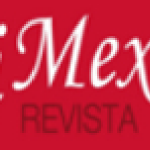
27. Februar 2014
von LS
Keine Kommentare
Mein Artikel in der neuen iMex-Ausgabe ist online:
Todo crimen es un acto de posesión: Buñuel y sus heroínas
Resumen
Ensayo de un crimen es una obra en la que nada es lo que parece.
Buñuel nos seduce con su universo misterioso y desconcertante, y con su mirada íntima en la vida de sus protagonistas, que se pierden en un laberinto surrealista de planes truncados.
El siguiente análisis ilustrará por medio de la estructura y la narrativa las constelaciones principales formadas por el protagonista y los variopintos personajes femeninos, y aclarará la relación entre víctimas y villanos en esta obra, que pretende ser la historia de un crimen, pero que en realidad enfoca la búsqueda del placer que se encuentra en el sentimiento de tener poder sobre las mujeres.
Asimismo, el análisis desvelará que esta película no sólo transforma los mitos femeninos relacionados con la Virgen de Guadalupe y la Malinche, sino también rompe las fronteras entre ficción y realidad reflejando –a través de la vida de Archibaldo– las obsesiones y ansiedades personales del maestro.
Viel Spaß beim Lesen!
14. Juli 2013
von LS
Keine Kommentare
Ich nehme diese Woche (15.07 -19.07) an der Konferenz in Nancy (http://www.atilf.fr/cilpr2013/) teil, daher entfallen alle Sprechstundentermine und die Beantwortung von Emails kann sich verzögern.
„Les mots nous intimident.
Ils sont là, mais semblent dépasser nos pensées, nos émotions, nos sensations.
Souvent, nous disons: „Je ne trouve pas les mots“.
Pourtant, les mots ne seraient rien sans nous. Ils sont déçus de rencontrer notre respect, quand ils voudraient notre amitié.
Pour les apprivoiser, il faut les soupeser, les regarder, apprendre leurs histoires, et puis jouer avec eux, sourire avec eux. Les approcher pour mieux les savourer, les saluer, et toujours un peu en retrait se dire:
„Je l’ai sur le bout de la langue – le goût du mot qui ne me manque déjà plus“.
Philippe Delerm